Victoria Dougherty's Blog, page 3
January 25, 2024
What Does It Mean to Be an Outlier?
out·li·er
NOUN
a person or thing situated away or detached from the main body or system:“less accessible islands and outliers”a person or thing differing from all other members of a particular group or set:“an outlier in Faulkner’s body of work” · “then there are the corporate outliers, people who just don’t fit into the culture of the company”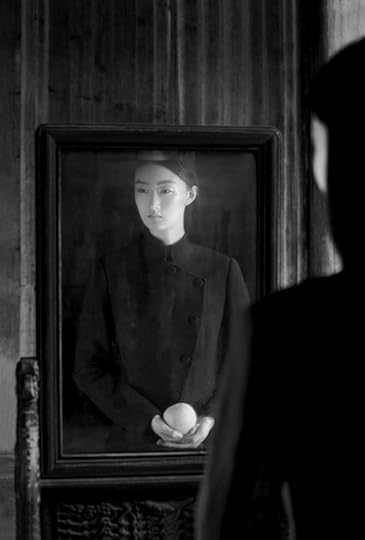 She doesn’t seem like a joiner.
She doesn’t seem like a joiner.I know several people who revel in their outlier status. They genuinely don’t enjoy being part of a group – at least not one that isn’t loose and sparsely populated by people who themselves bristle at affiliations, whether they be political, professional, or simply hobby related. It’s not that these confident nonconformists don’t like people, necessarily. According to their own self-reporting, many outliers have very strong interpersonal relationships, like a ride or die best friend, or a close marriage and a loving, dynamic rapport with their children. In fact, many people who identify as outliers say they simply prefer the mile deep to the inch wide and are perhaps at their core suspicious of conformity. Even when it comes to issues that are close to their hearts and align with their values.
I think about what it means to be an outlier a lot, because I probably am one. I say “probably” because I’ve never really been comfortable with that moniker. I feel conflicted about feeling like the perpetual observer, the outsider who never quite fits in. I don’t even know for sure that other people view me this way. It might be my own distorted view of myself. One born of being a child of immigrants, of being a fantasist, of liking long walks taken alone and the solitary nature of cold winters, of preferring books and movies to real life, of thinking Spam actually tastes pretty good. Since many of you who are reading this are probably nodding along, saying “Yes, that’s me, too,” I question whether this makes us outliers at all. I mean, if a lot of people consider themselves outliers, or at least as having outlier tendencies, then does being an outlier even exist?
Maybe the real question is this: What does it really mean to have something in common with a group of individuals?
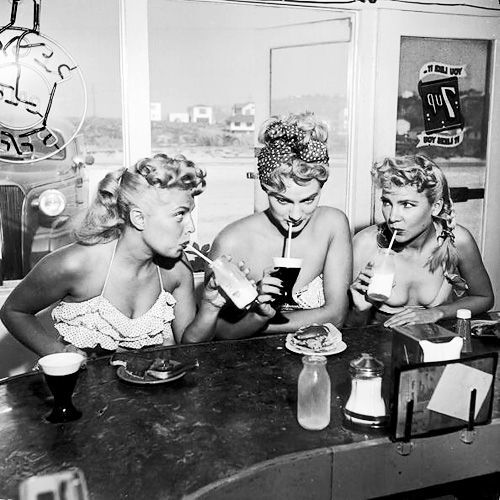 They’re all blonde and enjoy liquids.
They’re all blonde and enjoy liquids.When I lived in Prague in the 1990s, the only obvious thing I had in common with the friends I made there – people I consider my people to this day – was our spirit of adventure. Each one of us had packed our bags and bought a one-way ticket to the wild, wild east, having no other plan than to experience whatever came our way. To inhale the “sweet gas of life,” as author Tom Robbins put it. We were middle class state school kids and rich Ivy Leaguers, poets and lawyers, city slickers and the smallest of small towners, the popular kids and the nerds.
It was the only time in my life when I felt like I was a natural part of a group. I didn’t even have to try to fit in and I rarely felt out of my element, even though my friend group was a mishmash of people who often didn’t even share the same country and culture. We were American, British, Scottish, Canadian, Irish, Australian, Czech, Croatian, German, French, Korean and Californian.
Before then, since then, I have mostly found myself nose to the glass watching people in other groups cavort. The ease with which they fall in together, their shared sense of humor, their similar political views, literary tastes, fashion sense and recreational activities all trigger within me a complex brew of envy and longing. For these group members, it seems to me every day has the tempo and tenor of a garden party. One made of hearty, harmonious agreement. I’m quite sure this isn’t really the case and that the people who are part of these groups struggle with all sorts of things invisible to me. The office politics, the falling out with friends over affairs of business or of the heart. The digs, the one-upmanship, the keeping up with the Joneses, the toxic in-group cultural bugaboos that can bring an individual down. For all I know, most of these folks feel a deep sense of loneliness and isolation within their own ingroups, even if they’d never in a million years consider leaving them to seek out new friends.
 We all look great in in bikinis – let’s hang out!
We all look great in in bikinis – let’s hang out!But among all the convivial people in my sights, I’ve been especially cognizant of those who defy characterization altogether; the ones who are able to leave and join new groups with apparent ease, essentially never seeming like outliers no matter where they are or with whom they’re socializing. In my observations, most people like this aren’t fakers or habitual charmers, but they are very adroit at finding out what they do have in common with others and leaning into that hard. I think about the army brat or corporate animal. Each time they move to a new state or country they have to do their utmost to fit in, find people with whom they can laugh, confide in, share time.
What most of these on-the-move types have told me, is that they often find themselves onboarding to different groups depending on how, in their estimation, they intersect with the culture of their new environment. It doesn’t always work as well as they hope. A friend of my daughter’s, a diplomat’s son who moved roughly every two years during his entire youth, explained to her how strange it was to go to High School at one of the international schools in Dubai. How poor he felt there, even though he knew that by any reasonable standard he was a comfortable, fortunate, and worldly young man. Yet in a class where every girl sported a Birkin Bag and one of his peers – I kid you not – drove a gold-plated Ferrari, he felt like a scrappy outlier who was never going to be able to keep up.
I can relate to his story of how a mere change in location has the ability to distort our perceptions of ourselves like a funhouse mirror. I vividly remember the discombobulating feeling of being universally liked at one school, welcome at every lunch table and as a participant in any playground game, then shunned when I transferred to a different school. Nothing about me had changed, and my new school was just across town, not on the other side of the world. It wasn’t even noticeably different on a socio-economic level, as both schools were private, Catholic, and catered mostly to middle and upper middle-class kids. But an altercation I had with a mean girl on my first day made me persona non grata.
“Can I play?” I’d asked the girl and her group of friends. They’d started a game of Chinese jump rope at recess. I’d approached them carrying a full packet of lemon drops my grandmother had packed in my lunch.
“Only if you’ll give us all your candy and be our slave,” the mean girl replied.
My rejection of her terms – I actually thought she was kidding at first – violated some unwritten social contract at that school, and I found myself as the social outcast of my third-grade class. It was the one time I was an accidental and totally involuntary outlier, and to this day, I shudder thinking about it.
 Relate.
Relate.According to Malcolm Gladwell, who actually wrote a book about outliers, we humans are not the independent thinkers we’d like to think we are. He says, “The values of the world we inhabit and the people we surround ourselves with have a profound effect on who we are.”
I certainly felt that at the school where no one would talk to me. Everything about me seemed to change in that one awful year and I was powerless to stop it: my posture, voice, temperament, and confidence shifted dramatically. I felt tongue-tied all the time and unsure of my point of view. I was even sick more often. This was, as I look back, a turning point. A time when all I had left to me was my interior world and I inhabited it completely. In one fell swoop, after a single encounter with the wrong girl, I was made aware of what it truly means to be on the outside. I also became suspicious of groups, but it didn’t stop there. That experience made me question my own nature and my very ability to make friends. It took everything I had to pull myself back together.
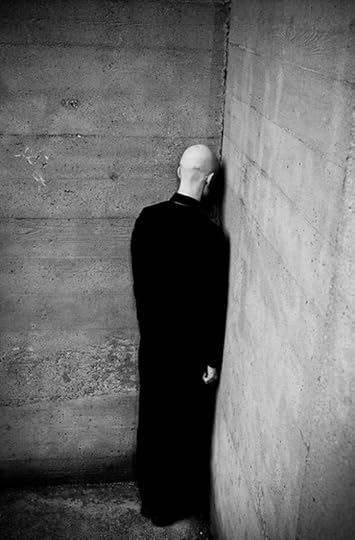 3rd Grade.
3rd Grade.I have to wonder if this was the experience that made me start considering myself something of an outlier? Even more so than being an oddball immigrant, an interior person, fantasist, and Spam lover. It’s hard to say. It’s certainly possible that most self-identifying outliers have faced similar social dilemmas; some pivotal event that made them reconsider this whole group thing and start turning inward. Maybe most outliers don’t start out as socially recalcitrant at all. Not in our hearts, no matter how much we might protest to the contrary. The very fact that most of us even endeavor to be part of any group, which is a separate issue from actually being good at it, is evidence of that. That we’re capable of being deeply wounded by rejection indicates that we’re pack animals after all. The runts of the pack, probably, the ones who are always a bit out of step, but still bona fide members.
“We allow our ignorance to prevail upon us and make us think we can survive alone, alone in patches, alone in groups, alone in races, even alone in genders.” –Maya Angelou



January 4, 2024
You Say You Want a (New Year’s) Resolution?
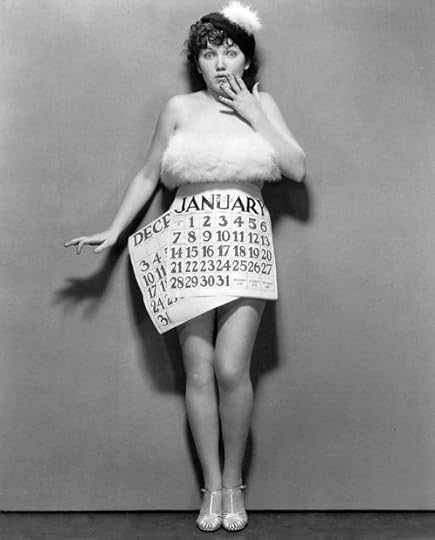 Oops.
Oops.It’s a New Year and I’ll admit I haven’t given the slightest bit of thought to an actual New Year’s Resolution. I have nothing against them, as those of you who have been around the Cold for a while undoubtedly know. I love to make them, I love to keep them, and I love to break them. All of these scenarios I consider a win-win.
My previous resolutions – even when broken – have been a resounding success. They’ve helped me make friends or make peace with losing one, improve my health, impose a much-needed policy of gratitude or optimism (perhaps they’re the same thing), and essentially perform some basic hygiene on my life.
I’ve tried every kind of New Year’s resolution imaginable. In years gone by, all drinkable alcohol has been banished from our house, for instance. To be honest that one didn’t live up to its promise: the mental clarity, the better sleep, the fact that we wouldn’t even miss it – ha! I think I’m a bit too temperate a personality for abstinence to really pack a punch. Other resolutions have been more successful; like vowing to accept all invitations extended to me in an effort to make friends and expand my circles, my life, my interests. That one was nothing short of big bang, and I’m still reaping the benefits of it four years on.
I think the reason why I haven’t come up with something to do this year, something to change, or at least to contemplate, wrestle with, muse upon, is that I got a head start on this self-improvement business back in the early fall, long before the actual New Year was even remotely in sight. Necessity is the mother of invention, after all, and I’ve been in great need, so I guess I couldn’t wait.
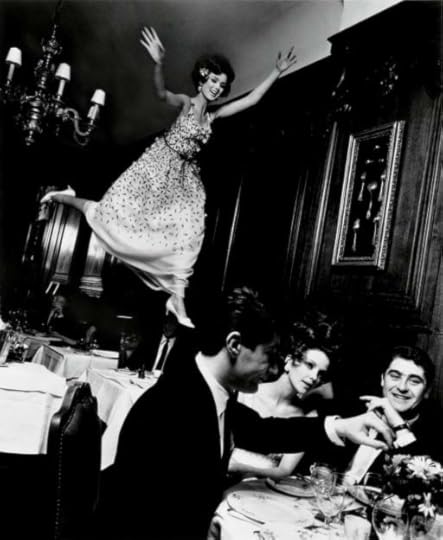 Got ahead of myself, like this gal.
Got ahead of myself, like this gal.Since resolutions mostly consist of changing habits – or attempting to change at least one habit – my habit revolution…maybe more of an evolution…started all those months ago during a creative stammer episode that was dragging me down, making me unproductive and generally poor company to be around. I felt depleted, both spiritually and mentally. Worn out, conflicted, lost. This feeling extended beyond my workday and manifested itself as a general malaise that I can only describe as a state of faithlessness, an uncomfortable embracing of fear. Fear of today, of tomorrow, of ten years from now. Fear of my actions, my inactions and of missed opportunities. At its core, it’s not an exaggeration to say that I was standing on the precipice of a crisis.
That’s a dangerous place to be. Especially since I didn’t realize just how down in the dumps I’d become until I actually started climbing out of my hole.
Thankfully, through a combination of dumb luck and support from those in my nucleus, as my science-minded brother likes to say, I was inspired to take action before this gathering storm really had the time and momentum to wreak some serious, category 5 damage. With a bit of nudging from those who know me best, I began a regimen I’ve documented pretty thoroughly here in the Cold, incorporating Julia Cameron’s artist’s bible, The Artist’s Way, into my life, one directive at a time. Since making just a few basic, resolution-like changes, my creativity has started to flourish, and with it has come a sense of gratitude and hope that has spread like a contagion to other parts of my life.
I’ve been writing, brainstorming story ideas, book coaching a friend, reading fiction, cooking according to recipes well outside my wheelhouse, storyboarding new ideas, and even corralling my artsy daughter into helping me take a stab at developing a line of design-heavy, hella-stylish merchandise. As I’ve continued with my daily creative exercises, mostly articulated by Ms. Cameron, although I’ve added a couple of my own as well, my imagination has started to make a comeback. Once again, I find myself with more ideas than I can possibly implement, which is a good problem to have, I think.
But what I don’t have, as a result, is a New Year’s Resolution. In fact, all the ones I’ve come up with seem same old, same old, if you know what I mean.
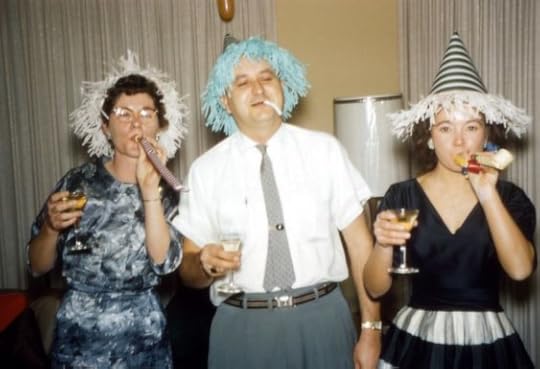 I can think of a few things these folks might think about giving up.
I can think of a few things these folks might think about giving up.That’s where you all come in. Your mission, should you choose to accept it, is to chime in with your ideas on some marvelous, creative, even off-the-wall New Year’s Resolutions – for me, for yourselves, for the world. In doing so, I ask that you tackle the primal, and don’t allow fear of the unorthodox to act as your governor. But please, none of this giving up chocolates or beer stuff. For one, chocolate should never be given up – not under any circumstances. As for beer, you should certainly give it up if it’s causing you problems, but it is worth noting that the oldest recipe ever discovered is for a nice, amber-colored ale. This kind of stuff matters to a historical junkie like me.
When conjuring a really good resolution, I’d like you to think about the widest, longest possible impact, too. Something that, even if seemingly small, will reverberate throughout the year – maybe throughout the course of a lifetime. I had a friend who once pledged not to give unsolicited advice, for instance. I thought it was such a great idea that I immediately incorporated it into my own life, and I believe that small, borrowed resolution has saved me from many unfortunate scenarios.
That’s the kind of thing we’re going for. And once I receive your suggestions, I’ll post as many of them as possible, pick one, tell you exactly why I’m picking that one, and keep you posted on my progress. I’ll be honest about it, too. Swear!
I also encourage you to do the same – that’s why I’m going to post a pick of your suggestions. To give you choices as well, and from some of the best idea generators I know (this means you).
If your mind is drawing a blank this year, I’d love to hear all about your previous New Year’s Resolutions. Why you chose them and what they meant to you. What impact, if any, they’ve had on your life.
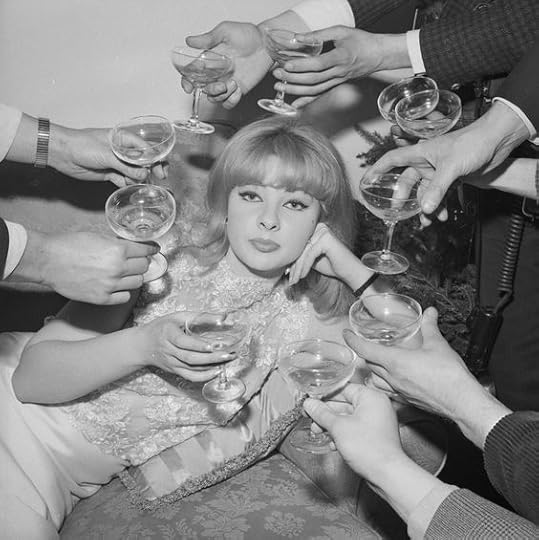 This year I vow to be more like this queen.
This year I vow to be more like this queen.By the way, it’s a New Year and there’s a new novel by comic thriller prosateur VJ Fitz Howard coming your way. Next of Kin is the fourth book in the Tami Vaduva series and it’s a killer! If you’re a fan of Janet Evanovich’s Stephanie Plum series or Carl Hiaasen’s adult novels, Pre-order your copy today!
WHEN THE MOST HIGHTLY DECORATED FEMALE COMBAT SOLDIER IN U.S. ARMY HISTORY SWORE TO DEFEND AMERICA AGAINST ALL ENEMIES FOREIGN AND DOMESTIC, SHE NEVER RECKONED THAT WOULD MEAN GOING TO WAR WITH HER OWN DADDY!
But that’s exactly what Tami Vaduva must do when, during a séance with her
deceased husbands, the three-time widow is told that she must resolve her
crippling “daddy issues” if she ever expects to keep a man—and keep him alive.
Thus begins Tami’s quest to track down, and confront, the man who begat and
abandoned her before she was born. Accompanied on her mission by prospective
husband number four—a virile, millionaire hillbilly—the pair embark upon a
mission that will take them to the infamous Pentecostal church in West Virginia
where Tami’s rattlesnake-handling daddy once preached, to the southern shores
of the Dead Sea, where old scores will be settled, and finally to a remote
mountain compound where her messianic, heavily-armed daddy leads a depraved
sex cult.
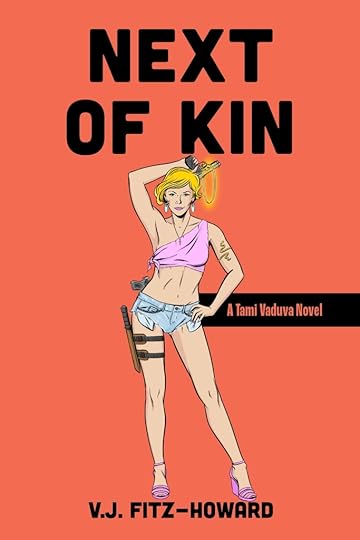
December 14, 2023
Twelve Cold Days of Christmas
This is more of a song than an essay. It’s certainly inspired by a song; one I’m sure you know. You’re welcome to do your best to sing it to the tune of the Twelve Days of Christmas. Or rap it, if you prefer. Doesn’t matter…as long as you take it into your heart. Maybe if it stays there over not just these next twelve days, but twelve months, you’ll find the spirit of these words and their concurrent offerings will accrue.
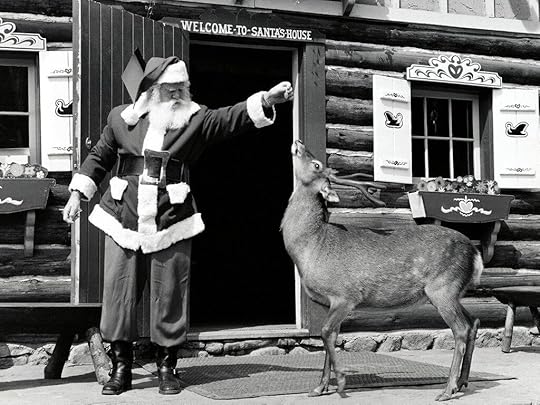 Don’t be fooled – this man works all year round.
Don’t be fooled – this man works all year round.On this first day of Christmas, chilly and clear, a dusting of snow on the mountains outside my window, I, a humble author who writes about True Love an awful lot, gives to you, dear reader, a cardinal, the color of a Hitchcock blonde’s scarlet lipstick, perched on the bare branch of a weed tree.
On the second day of Christmas, this author who writes about True Love an awful lot, as I said, also offers you two shots of good whiskey plus two handsome middle-aged males snoring on a living room sofa (although one of those fetching males is a canine), and a cardinal, the color of a Hitchcock blonde’s scarlet lipstick, perched on the bare branch of a weed tree.
On the third day of Christmas, this True Love obsessed author with a curious interest in killers, spies, and grandiose destinies, gives you, my faithful reader, an on-going story trilogy made of ancient curses, star-crossed lovers and archaeological adventures, two shots of hella good whiskey plus two true-hearted handsome middle-aged males snoring on a living room sofa (remember, one is a canine), and a cardinal, the color of a Hitchcock blonde’s scarlet lipstick, perched on the bare branch of a weed tree.
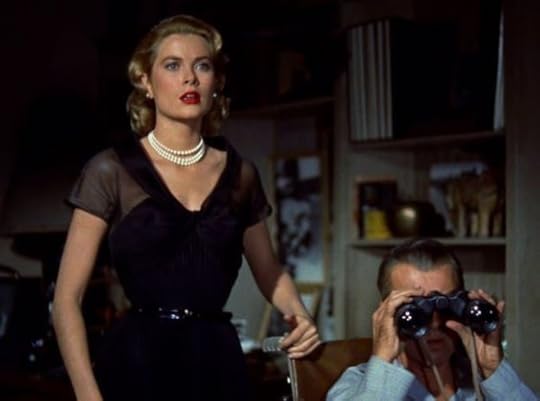 That’s some great lipstick.
That’s some great lipstick.On the fourth day of Christmas, this author who fervently believes that the transcendental power of love belongs in even the most harrowing, dark, and war-torn stories, is honored to give you four heart-felt whispers of devotion, an on-going story trilogy made of ancient curses, star-crossed lovers and archaeological adventures, two shots of really great whiskey that burns so good as it goes down plus two handsome, true-hearted, unafraid to make grand romantic gesture-type middle-aged males snoring on a living room sofa (although one is a canine, and yes, even he makes romantic gestures. Like the way he greets me every time I come home), and a cardinal, the color of a Hitchcock blonde’s scarlet lipstick, perched on the bare branch of a weed tree.
 A true-hearted middle-aged male.
A true-hearted middle-aged male.On the fifth day of Christmas, your favorite love scribe with a serious fixation on mystery, thrills, and noir gives you five unapologetically sentimental and spiritual Christmas carols sung by an amateur choir of rum-drunk revelers!
Four heart-felt whispers of devotion, an on-going story trilogy made of the craziest ancient curses, starry-eyed star-crossed lovers, and bold archaeological adventures, two terribly handsome middle-aged males snoring on a living room sofa (although one is a canine), and a cardinal, the color of a Hitchcock blonde’s scarlet lipstick, perched on the bare branch of a weed tree.
On the sixth day of Christmas, this love-drunk, thriller-lover of an author is so happy to give to you six handmade marionettes gyrating at the command of a bawdy mistress (that would be me), five unapologetically sentimental and Spiritual Christmas carols sung by an amateur choir of rum-drunk revelers!
Four heart-felt whispers of devotion, an on-going story trilogy made of only the most powerful ancient curses, charming star-crossed lovers and riveting archaeological adventures, two shots of great, artisan whiskey (ah!) plus two handsome, true-hearted, full of soul and mischief middle-aged males snoring on a living room sofa (although one is a canine), and a cardinal, the color of a Hitchcock blonde’s scarlet lipstick, perched on the bare branch of a weed tree!
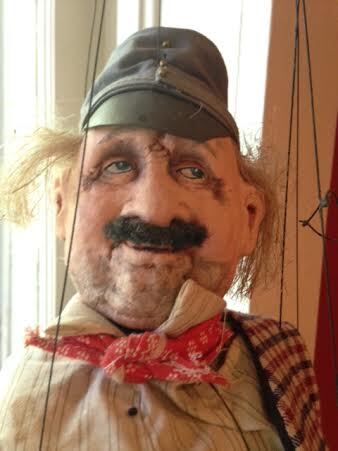 Vladimir, the hand-made marionette that hangs in my office. I’ll make him dance for you!
Vladimir, the hand-made marionette that hangs in my office. I’ll make him dance for you!On the seventh day of Christmas, this noir-fixated hopeless romantic of an author gives to you seven bad and beautiful dames with velveteen voices and shady pasts that would make you shudder, six handmade marionettes gyrating at the command of a bawdy mistress, five unapologetically sentimental and spiritual Christmas carols sung by an amateur choir of rum-drunk revelers!
Four sweet, heart-felt whispers of devotion, an on-going story trilogy made of monstrous ancient curses, impassioned star-crossed lovers and wild, time-traveling archaeological adventures, two fine shots of my best whiskey along with two handsome, true-hearted, romantic, and mischievous middle-aged males snoring on a living room sofa (although one is a canine with terrible gas), and a cardinal, the color of a Hitchcock blonde’s scarlet lipstick, perched on the bare branch of a weed tree.
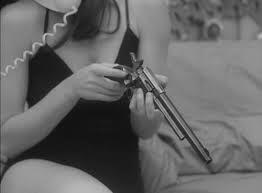 I don’t know about you, but I think this dame’s up to no good.
I don’t know about you, but I think this dame’s up to no good.On the eighth day of Christmas, this lover of love, evangelist for old souls and unapologetic prose junkie is dying to give to you eight haunting phases of the moon shining upon the wintry alleys of an old Gothic city center, seven bad, gorgeous, and wanton dames with smoky, velveteen voices and pasts so shady you wish you hadn’t asked, six handmade marionettes gyrating twerking at the command of a bawdy mistress, five unapologetically maudlin and resoundingly spiritual Christmas carols sung by an amateur choir of rum-drunk revelers!
Four sweet, heart-felt whispers of absolute devotion, an on-going trilogy of time-spinning ancient curses, bewitching star-crossed lovers and spine-tingling archaeological adventures, two super handsome, true-hearted, witty, over-fed middle-aged males snoring on a living room sofa (although one is a canine and not particularly witty), and a cardinal, the color of a Hitchcock blonde’s scarlet lipstick, perched on the bare branch of a weed tree!
 Prague was made for moonlight.
Prague was made for moonlight.On the ninth day of Christmas, this shameless maven of love scenes (among other things) gives to you nine lingering kisses bestowed by a lover pure of heart though not pure of thought, eight haunting, utterly enigmatic phases of the moon shining upon the enchanting wintry alleys of an old Gothic city center, seven bad dames with bad attitudes and smoky, velveteen voices who have the kinds of shady pasts that make them the sorts of ladies you’d never bring home to your mother, six handmade marionettes twerking and gyrating like Meghan Thee Stallion at the command of a bawdy mistress, five unapologetically gushing and soul-screaming Christmas carols sung by an amateur choir of rum-drunk revelers!
Four sweet as hell, heart-felt whispers of unconditional devotion, an on-going story trilogy made of unbreakable ancient curses, fiery star-crossed lovers and breathtaking archaeological adventures, two of my favorite handsome, true-hearted, rascally but protective over-fed middle-aged males snoring on a living room sofa (although one is a canine), and a cardinal, the color of a Hitchcock blonde’s scarlet lipstick, perched on the bare branch of a weed tree!
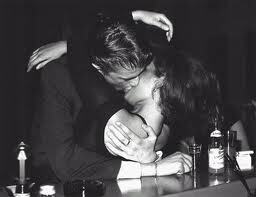 I’ll take nine of these, please.
I’ll take nine of these, please.On the tenth day of Christmas, this author of mysterious thrillers, noirs and romantic epics of historical fantasy is doing her personal best to give you ten lines of prose that strike a knife into your heart, force a gasp from your lips, and breathe life into your soul, nine lingering kisses bestowed by a lover so pure of heart, though not pure of thought, that your own heart grows three sizes larger than The Grinch’s at its best, eight hauntingly entrancing phases of the moon shining upon the wintry alleys of an old Gothic city center, seven dames so bad and tempting with smoky, velveteen voices that make you say “to hell with their shady pasts, I’m bringing them home to my mother anyway,” six handmade marionettes twerking and gyrating in a way that would make Meghan Thee Stallion blush – all at the command of a bawdy mistress, five unapologetically uber-sentimental and soulful, holy Christmas carols sung by an amateur choir of rum-drunk revelers!
Four sweet, heart-felt whispers of unadulterated devotion, an on-going story trilogy made of only the best ancient curses, star-crossed lovers and archaeological adventures, two handsome, true-hearted, romantically inclined yet darkly humorous middle-aged males snoring on a living room sofa (although one is a canine), and a cardinal, the color of Hitchcock blonde’s scarlet lipstick, perched on the bare branch of a weed tree!
As promised, ten lines of prose:
Semyonov inhaled Zoya’s scent. Woodsy, like his father’s mistress’s cabin.
We all become our fathers, he thought to himself. His father had been poisoned by his mistress after he tried to break things off with her, and Semyonov wondered how many times Zoya had thought of killing him. How close he might come to his father’s fate now that she had come back into his life.
His Zoya took a deep breath, running two fingers through her hair, coiling it around them in an almost girlish gesture. “What about me? What besides sex did you love about me?”
Their sexual relationship had been the least fulfilling part of their coupling, but he wasn’t about to tell her that. She would have been greatly offended. Zoya was a tempting woman and a skilled lover, but she was meant for causes, not other people.
On the eleventh day of Christmas (almost there!), this exhausted author, besotted by love stories, inexplicable mysteries and fantastical histories wishes for you to receive eleven prayers answered unironically by our maker, ten lines of prose that strike a gilded sword into your heart, force the air from your lungs and a gasp from your lips, and breathe life into your soul, nine soft, lingering kisses bestowed by a lover pure of heart though not pure of thought, eight ethereal phases of the moon shining resplendent upon the wintry alleys of an old Gothic city center, seven oh, so very, very bad and beautiful dames with smoky, velveteen voices and the kinds of shady pasts that let you know you don’t have a prayer as long as you’re with them, but you don’t care what your mother or anyone else has to say about it, six handmade marionettes just slumped on the floor and no-longer gyrating because the bawdy mistress who was commanding them is busy drinking a mug of mulled wine, five unapologetically feel-good and brazenly spiritual Christmas carols sung by an amateur choir of rum-drunk revelers!
Four sweet, heart-felt and sensual whispers of devotion, an enthralling, on-going story trilogy made of ancient curses, star-crossed lovers and archaeological adventures that would make Indiana Jones jealous, two dashing and true-hearted middle-aged males snoring on a living room sofa (although one is a canine), and a cardinal, the color of a Hitchcock blonde’s scarlet lipstick, perched on the bare branch of a weed tree!
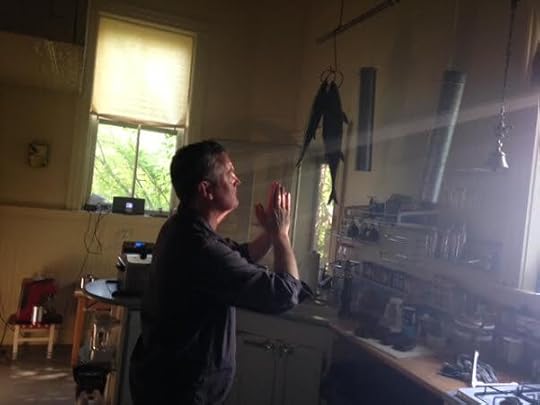 This handsome, middle-aged man never had a prayer.
This handsome, middle-aged man never had a prayer.And on the twelfth day of Christmas, may twelve cold winds blow, each of them bringing you clarity of mind and heart: one wind for your past, another for the present, yet another for the future; one for those you’ve loved, and one for those you’ve lost to death or disagreement; one for the dreams you’ve delayed, and one for those you’ve pursued; one for the child within you, and another for wise elder you have built through experience; one for your caring mentors and another for your harshest teachers, and lastly, the coldest one for actions you take in this coming year. The ones that will help others and define your experience.
No, I haven’t forgotten eleven prayers answered, unironically by our maker, ten lines of prose that strike a blade into your heart, force a gasp from your lips, and breathe life into your soul, nine lingering kisses bestowed by a lover pure of heart though not pure of thought, eight haunting phases of the moon shining upon the wintry alleys of an old Gothic city center, Seven bad and beautiful dames with smoky, velveteen voices and shady pasts that make you want to cry, six handmade marionettes gyrating once again at the command of a bawdy mistress who has downed two or three cups of mulled wine, five unapologetically sentimental and highly spiritual Christmas carols sung by an amateur choir of rum-drunk revelers!
Four sweet, heart-felt whispers of devotion, an on-going trilogy of ancient curses, star-crossed lovers and archaeological adventures, two strikingly handsome, true-hearted, witty and overfed middle-aged males snoring on a living room sofa (although one is a canine), and a cardinal, the color of a Hitchcock blonde’s scarlet lipstick, perched on the bare branch of a weed tree!
I wish you the merriest and the brightest this year.
 There is simply nothing like a Prague Christmas.
There is simply nothing like a Prague Christmas.And while we’re at it, you should know that the BREATH series is on sale all this weekend (December 15 thru 18). It’s not too late to give yourself or a loved one the gift of an epic tale that will keep them up all night turning pages!
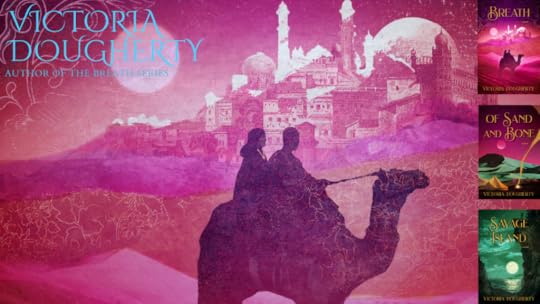
December 7, 2023
Breakthroughs
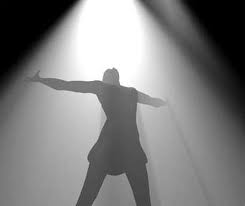 Hallelujah!
Hallelujah!A few weeks ago, I shared with you all the gory details of a creative stammer I’ve been experiencing. That I feel a bit like a defective radio that can’t quite tune in to her favorite station anymore. This happens to all sorts of creative people who are in various stages of their careers and artsy lives. Getting stuck isn’t just for beginners, for imaginers who have yet to build a structure around them, enact a disciplined calendar and sequence of deadlines, who perhaps haven’t yet developed the confidence to make a real go of the artists’ life. It happens to writers like me, who have been doing this for over twenty years now in a professional capacity, and for several years prior to that as a hobbyist.
Creative stammers are deeply frustrating and destabilizing. They allow boredom to creep into every facet of the process, making work feel like an unpleasant chore, and one executed poorly at that. Seasoned creators know what it’s like when the juices are flowing. Our minds are alive with ideas even as we’re effectuating the mundane. We may look like we’re merely checking off items on our grocery list, walking up and down the aisles plucking cans off the shelves, yet we’re working. The pause in front of the dairy case was to jot down an idea. At the top of that crumpled piece of paper which reads garlic, milk, butter, rice, Cheetos, you’ll also find: He tracked her down and followed her to Putnam! Possible names: Alberto Aragon, Humberto Haro, Alejandro Trastamara. Things like that.
Waiting for your child to finish a late-running theater rehearsal isn’t an inconvenience at all, but an opportunity. To fix plot problems, conjure up complications, dangers, adventures, and love affairs. Every day comes with a fantasy world playing at low volume throughout all the tasks at hand, from filling the gas tank to folding laundry.
When that shadow world goes dark, a creator can feel lost.
 Relate.
Relate.I don’t want to go all gloom and doom here. In my case, my shadow world didn’t go entirely dark, but it did grow dim at times and for significant stretches that could feel interminable. The low volume chatter normally emanating from my fictional worlds went so quiet that it took great concentration for me to make out anything my characters were saying. All of this resulted in a state of restlessness and anxiety, as I never knew when my stammer would hit. I found myself indulging in avoidance and outright procrastination. This, in turn, made me furious with myself, tossing around words like fraud, amateur, shiftless, dull, in an edgy mind’s voice. My mind’s voice can be a real bitch.
But let’s not get the violins out quite yet.
Because now I want to tell you about what a breakthrough feels like, and how I’ve been engineering one – a day at a time. A breakthrough need not be a deluge. Mine certainly hasn’t been. But it is a light. A cracked window that lets in the fresh air. It’s something to build on. What it has not been is an experience that has visited out of the blue. No fireworks went off above my head, nor did I rub a lamp to make a genie pop out and grant me a wish. I’ve generated this breakthrough quite consciously, in the process encouraging my critical mind’s voice to speak more softly, become part of the solution rather than part of the problem.
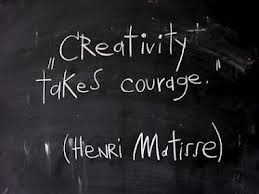 It also takes time and commitment.
It also takes time and commitment.Previously, here on Cold, I told you I’ve begun reading The Artist’s Way, by Julia Cameron. How it’s been a revelation, and I’ve been absorbing it slowly. It’s called “the artist’s bible,” and for good reason, as it is basically an instruction manual for living an artist’s life. Of arranging your daily regimen in a way that propagates invention. I’ve been taking Julia’s advice bit by bit – and I do feel like she and I are on a first-name basis now – incorporating her rituals into my weeks one small step at a time. I began with Morning Pages, a habit of writing by hand no less than three full pages – stream of consciousness style – first thing. This addition to my daily routine has been nothing short of a bombshell, a true kicker, and I credit this single practice with reconnecting me to my ideas – tuning in the radio, so to speak, so that I can hear my shadow world better, access it at will again, even if the characters in that world are still only fumbling around, trying to figure out what to do with themselves.
Then I added two more elements, which are also paying dividends. The first, is a daily ritual of reading at least one chapter of fiction. And I do make a ritual out of it. I dress in comfortable clothes, pour myself a tall glass of water, and settle onto my office sofa, with my dog nestled between my feet. For someone like me, who has been so consumed with writing in the hours I have free, who is exhausted at the end of the day and has a hard enough time reading a single page, this has required a real commitment. Reading someone else’s words, inhabiting their world, is inspiring in me new ways to look at the stories I’m building, infusing me with creative fire…well, maybe merely spark at this point, but that’s no small thing. And it’s pure pleasure, too. That’s no small thing either.
 I don’t actually read on the toilet.
I don’t actually read on the toilet.The second is a weekly artist’s date. According to Julia Cameron, an artist’s date can mean a number of things. Going to a movie, for instance, is a perfectly respectable artist’s date. These should be fun, by the way. Play is relevant to the process of creation and it’s easy to forget that, dismiss it as frivolous – a distraction from our relentless pursuit of the muse.
For me, this date has been a weekly Zoom call with my fellow writer friend Janet. Apart from talking about fiction, culture, art, and the business of writing, I’m also book coaching Janet through a detective series she’s planning. To those of you who are scratching your heads wondering what exactly a book coach is, think of it this way: An editor comes to your work in a forensic capacity. In other words, after you’ve finished your story. An editor gives advice on what to fix in your manuscript and how. A book coach is often there from your first word. Sometimes from the idea stage – inspiring, cajoling, even cracking a whip from time to time. This combination of talking about our work as artists and helping Janet through her own creative launch has been golden.
Now here’s my own advice, not Julia’s, although she may get into this later in her book: giving to other artists is a critical part of nurturing our own artist spirit. It’s made me feel lighter, laugh easier, care deeper, and has helped me not only to take my own advice, but adapt it, make it evolve to suit not just my routine, the routine of a writer, but a routine. The routine of a creator of any stripe. Routine, despite how eclectic the artist’s life may appear from the outside, is ultimately the genesis of every idea, the generator behind any finished project. It makes space for impressions and observations, hunches and phantasms, joy. Because at its core, creativity is about joy. Of turning grief into growth, chaos into order, confusion into wisdom. Creativity is joy for joy’s sake. It is the powerful motor of the universe, the transformer of hearts, and the designer of souls. It is the only alchemy worth a damn.
 Joy is the birth of ideas.
Joy is the birth of ideas.With my change in routine, with the addition of Morning Pages, reading fiction, and having an artist’s date, I’ve managed to write a full new chapter in my detective noir. This is in place of just fiddling with the ones I’ve already written and doing largely unnecessary research. I’ve also begun scribbling new and good ideas onto receipts, napkins, anything that I can shove into my pockets, or tuck into the back of my phone case. And I’ve written an essay.
Keep in mind, I’ve only been performing this new routine for a few short weeks. Imagine the long-term benefits!
This week, I plan to have my first full creative week in months. In addition to organizing my notes for various fictions and sketching out a half dozen topics for essays and podcasts, I plan to write one full new chapter in my detective noir, along with three fully storyboarded chapters for the third epic book in my BREATH series. These are self-imposed deadlines and deliverables that I finally feel confident enough to commit to.
This leads me to one more thing an artist needs in order to foment a breakthrough, turn it from a trickle to a gush. This is probably the most important thing, when push comes to shove.
Accountability. I’m asking you to hold me to it.

You know artists need your support. If you value our Cold community – our novels and worlds, blog, podcast, newsletter – please consider becoming a Cold Member! Cold merchandise coming soon!
November 19, 2023
Your Cold Annual Thanksgiving Meditation
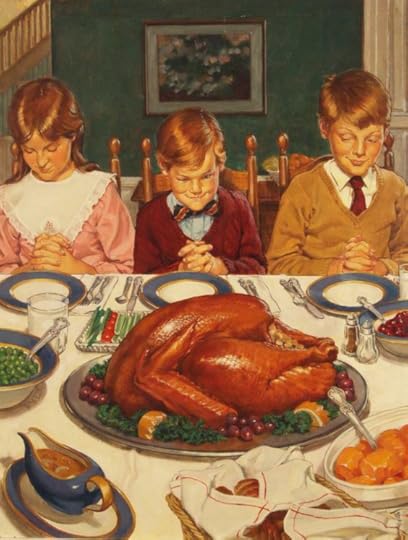 *snicker
*snickerPerhaps this isn’t an actual meditation, per se, but parts of it can definitely be chanted. In fact, this annual list of things for which I am eternally grateful may sound positively devotional if sung as a monkish incantation or whispered like a prayer. Whichever way you choose to experience the following gratitude missive, and I can think of a lot of ways – shouting it like a war cry, belting it out like a Glee Club member, or even yodeling it – I can one hundred percent guarantee that you will feel better for having absorbed it. Lighter, happier. This feeling might last an hour, a day, or all of eternity – it’s impossible to say.
What is possible to say is that there is no chance at all that you’ll feel the worse for it. So, what are we waiting for?
Let’s get this party started!
I’m thankful for my dog’s ears, which are the shape and color of mussel shells. They give a shiver when he’s dreaming. Watching them lie back or perk up, rubbing them between my fingertips as if they were flower petals, gives me a serene feeling of utter goodness that I am sure is actively extending my life by at least five years. I also love the way his ears smell – like musty corn chips with a hint of gruyere cheese and late summer grass. I would keep my nose near his ears all day long, if it wasn’t a little weird. While we’re on the topic of bewitching scents, I must also give a serious nod to lavender. Next to my dog’s ears, there’s nothing like fresh lavender. It’s not only aromatic, but visually arresting, and delicious as a flavoring agent. Ever tried a lavender latte? If you haven’t, you must!
 Barney and his ears (no lavender was harmed in the making of this photo).
Barney and his ears (no lavender was harmed in the making of this photo).My well-worn combat boots are hands-down my favorite pair of shoes and make me feel like such a middle-aged ass-kicker. I’ve had them mended and re-soled at least a half dozen times, and I fear each year may be their last. Yes, I could get another pair. Perhaps not the exact style I have – can’t find that anywhere anymore – but it would take months of daily wear for me to break them in, make the leather soft and pliable with just enough scuffing. So, I’m thankful they still have a little life left in them.
Then there’s Deborah Harkness’s All Souls Trilogy. What a marvelous make-believe world! Whether I have time for three pages or three chapters, I fall instantly into Harkness’s Anglophilic universe of enchanted ancient texts, polished, old English furniture, and romantic magical creatures. I’d love to meet her one day and thank her personally for the hours of pure joy that she’s given me. I’m also just mad for how the mountains near our home take on the appearance of impressionist paintings during the explosively prismatic fall. Autumn in our mountainous region is the best time to read Ms. Harkness’s trilogy, so that’s where I draw the connection. It’s crisp here and feels antique. Lots of old houses and wood-burning fireplaces. Very British colonial. Makes me want to mix a proper BBC accent with my adopted Virginia lilt.
 Thomas Jefferson’s Monticello just down the road from our place.
Thomas Jefferson’s Monticello just down the road from our place.No matter what time of year it is, I’m forever thankful for my son’s deeply ingrained sense of loyalty and honor, which causes my heart to swell at least once a week, and that my middle daughter’s relentless pursuit of excellence has me standing taller every day, and my youngest daughter’s resilience and philosophical nature leaves me in slack-jawed awe. I can hardly contain the gratitude I feel knowing that these creatures we brought into this world – badgered, corrected, embarrassed, and loved for years on end – still enjoy our company. Most of the time, they don’t even have to be begged and cajoled to attend Sunday dinners! Of course, I don’t delude myself either. I’m well aware that the older two, who are in college, will jump on any opportunity to have a decent meal that they don’t have to prepare or buy. But that’s alright. I’m grateful for whatever I get.
As for the man who made a mother out of me in the first place, I positively love when my husband grows a beard that makes him look like Ernest Hemingway channeling The Old Man and the Sea. His facility with language, his wry sense of humor, his generosity, and romantic soul still imbue me with a sense of bliss after all of these years. I don’t take that for granted for a minute.
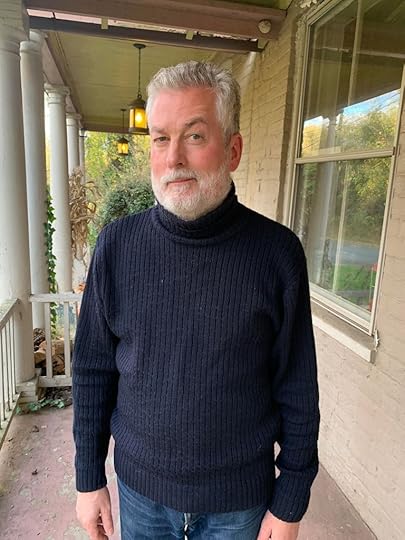 “Now is no time to think of what you do not have.
“Now is no time to think of what you do not have.Think of what you can do with that there is.” -Ernest H. The Old Man and the Sea
And I’m just pleased as punch to still be fighting complacency and dreaming big dreams for the future! Let’s move to Missoula for a year! Let’s start a new podcast or put together a writer’s retreat! While this kind of optimism and aspiration gives a huge boost to my well-being, so does functionality, which is why I’m also glad for the ant traps in my kitchen – they work brilliantly! And for eating outside at our picnic table on warm, but not muggy days. My husband’s Manhattans are simply divine (great for those picnic table occasions), and I’m thrilled that our kids are learning how to cook – and pretty darn well I might add. That’s completely selfish on my part, as I’m looking forward to the day when they offer to cook a holiday dinner. Or any dinner, really.
It’s not all just about fun times and swinging for the fences, however. As much as I hate it, I am indebted to the pain and growth that accompanies a falling out with a friend or family member, as well as for the hope that we will one day bridge our differences. Such episodes keep me up at night, make me feel like I’ve swallowed a swarm of bees, but they also force me to contemplate and enforce boundaries, as well as consider my part in these complicated dramas. With any luck, we learn not to repeat our mistakes or anyone else’s.
Back on a brighter note, I love answering the call to adventure, luxuriating in the passage of time, and reflecting on the past. I’m always grateful and on the look-out for the opportunity to dive deeply into conversations about anything from the art of puppetry to the pros and cons of spray tans. May many more of these long and winding talks come our way this year. They are golden.
 One of my favorite nights ever.
One of my favorite nights ever.For family traditions…and for flouting those traditions. For our wins, our losses, our purgatories, our daily prayers. For the smell of cloves and the taste of cinnamon. For long, pretty dresses that make a girl feel all wrapped up like a present, and comfortable clothes that look good, but make it seem like we weren’t even trying. Thank you.
But that’s not all.
I’m so obliged for big, gold hoop earrings, red sports cars, Haley Reinhart’s ballsy cover of Creep…oh, hell, anything she covers, every full tank of gas, dirty jokes, well-fitting jeans, just about any kind of creamy, winter casserole, a smoky red wine, a good yoga mat, family pictures, bird feeders, holiday decorations, a cozy pair of slippers, menageries of brac-a-brac, collections of well-loved books, jump scares in good horror films, first kisses in romantic movies, car chases in action flicks, death-defying stunts, breathtaking fight scenes, the excitement of buying a lottery ticket, finding an old concert stub in a coat pocket, rainy Sundays, a soul-rousing homily (sermon for non-Catholic types), getting the bills paid, purchasing a new pair of running shoes, fog – as long as I don’t have to drive in it, fresh pasta, the existence of golden scarab beetles, the myths of witches and vampires, the truths that history teaches us when we dare to listen, juicy literary villains, truly giving a hearing to opposing viewpoints, and allowing love to bloom, despite the fear of loss or a broken heart.
Thank you, thank you, thank you for all of these.
Last, but not least, I will never stop being thoroughly delighted and grateful for all of you reading this. Thank you for sticking with me all of these years. I wish you the absolute best, always.
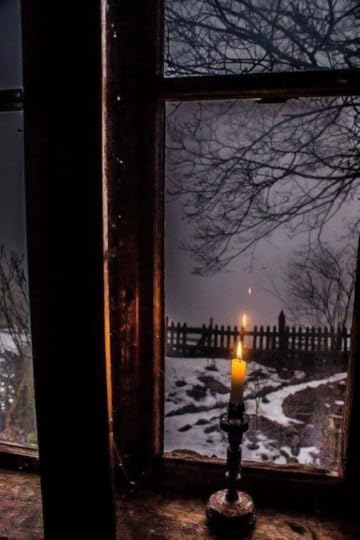
For those of you who are grateful for historical fiction, there’s a marvelous Bargain Booksy giveaway going on. You have a real chance to win a Kindle, plus lots of excellent historical fiction novels!
And yes, BREATH is one of the offerings 

November 9, 2023
Shining Daylight on the Creative Impulse

This is going to be a something of a stream of consciousness. An attempt at articulating a process that I’m still smack in the middle of. There will be no neat beginning, middle, and end. At least not today. Nevertheless, I hope you’ll indulge me, because I think this could be illuminating.
See, I’ve been experiencing what I would call a creative stutter. This is not to be confused with writer’s block, which is when a writer stares at a blank page for hours, days, or months on end while the whites of her eyes sprout spider veins, and a permanent garland of sweat beads forms along her hairline.
A creative stutter is more akin to having difficulty connecting with the work being put on the page. The most accurate analogy I can conjure is that of a half tuned-in radio station. It’s when you’ve found a great song that you love and want to wiggle your butt to in the bucket seat of your Jeep, but the experience is frustrating and inconsistent. Sometimes the song comes through loud and clear, and you start banging your hands on the steering wheel, belting out the lyrics and thinking, Hey, I sound pretty good. Then all of a sudden, there’s a bit of static and the melody is barely audible. It returns a few seconds later but begins to fade again, like it’s gone under water. You groan, you play with the dial trying to tune it in, and YES, you’re able to get it back! But only for a few lyrics. Just as you start singing along again, shaking your shoulders, swishing your hair from side to side, the static returns. Finally, you turn the dial to another station. It may not be playing the song you want to hear, but at least you can hear it.
This pretty much describes what I’ve been experiencing. It started roughly around the time my daughter went back to school, which also coincided with a change in the way we’re doing things this school year. My husband’s work schedule amped up, and I’ve had to do pretty much all of the driving (chauffeuring) of our daughter, not just to school, but to her various appointments and activities. Even a seasoned work-from-homer like me has trouble adapting to this level of disruption.
But if I’m to be honest with myself, this hiccup in my routine could be gotten around. I’ve done it before, and with multiple children to boot.

What’s really been plaguing me is simply the result of a bottleneck. A period in life where emotions, anxieties, the changes within us and around us, all seem to converge, making us vaguely uncomfortable. Dr. Suess called it “the waiting place,” and I think that’s spot on.
“Wherever you fly, you’ll be best of the best. Wherever you go, you will top all the rest. Except when you don’t. Because sometimes you won’t. I’m sorry to say so, but, sadly, it’s true that Bang-ups and Hang-ups can happen to you.” –Dr. Suess
I was sharing my exasperation about this creative issue of mine with a friend, and after listening patiently to my restless, stammering diatribe about the affliction, she asked me if I’d ever read a book called The Artist’s Way.
I told her I hadn’t. Truth be told, I’d never even heard of it.
But I trusted my friend, and didn’t feel I had anything to lose, so I ordered a print, hold-in-your-hand copy, then went about my business.
When The Artist’s Way finally arrived in my mailbox about three weeks ago, I’d almost forgotten I was waiting for it. I was happy to get it, but my initial excitement about the book had cooled, and I had a lot to do that day. So, I dropped the book next to my bedside table, then promptly left to pick up my daughter from school. In my haste, I’d placed The Artist’s Way on top of my book pile, essentially letting it jump in line to #1 on the stack of books that I’ve marked as “urgent: to-read.” That little oversight turned out to be fortuitous, as that night, as I crawled into bed, I reached over to the top of that “to-read” pile, grabbed The Artist’s Way and opened it up.
From the first sentence, I was hooked. It’s not an exaggeration for me to say that it felt like a big, bright light went off in my head, then its warmth began migrating down to my heart. It’s still in the process of that migration, but that’s neither here nor there.
The important thing is that soaking up just a few measly pages of this book truly made it feel like I was encountering a first sunny day after months of rain.
To give you a bit of background about what many creators have called “the artist’s bible,” I’ll first tell you that it’s written by a writer named Julia Cameron who also happens to be the ex-wife of film director Martin Scorsese. Not surprisingly, she’s pretty brilliant. What is surprising – or at least it was to me – is how spiritual a manual she’s written. I mean, it does say, “A Spiritual Path to Higher Creativity” right on the front cover, but I guess given how secular artists these days are, I didn’t really believe it.
Cameron is unapologetic about asserting that our creative inspiration comes from somewhere inside of us yet is connected to a greater entity. I should mention that she’s agnostic about what an individual artist might call that entity and invites the creator to insert their own interpretation. You can call that entity God, The Universe, or Sally Mcgillicuddy. She doesn’t care.
I opted for God, because I’m old school.
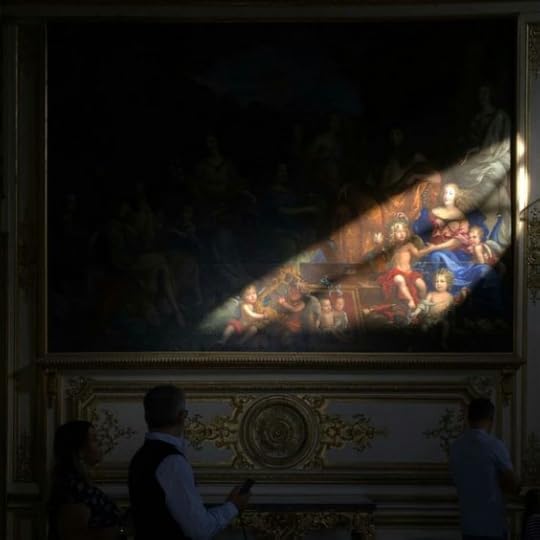
I could see from the start why The Artist’s Way is referred to as a bible, and it’s not just because of the spiritual approach I described. Unlike other inspirational arty type books – Rilke’s Letters to a Young Poet comes to mind – it’s not meant to be devoured. Cameron’s meditation/manual on unleashing the creator within demands to be taken bit by bit, applied to an artist’s process like coats of paint.
Only a few pages in, having barely slapped some brushstrokes of primer on, I started to notice a difference in myself. Cameron’s words about the creative process are gut-punch true, which certainly gets a writer like me in the mood. She asserts that creativity – regardless of how it’s expressed – is the natural order of life and comes from a light within that we are born to nurture. Powerful words, certainly. But it was her suggestion of trying a daily exercise which she calls “morning pages” that started to make a startling difference in the way I approached my work and my days.
“Morning pages” is a simple habit of getting up and writing three – no more or less – stream of consciousness pages first thing, or in my case, after I make my coffee. It doesn’t matter what gets put on the page, only that it flows from what’s top of mind. No editing, no hesitating. “Morning pages” don’t even have to be about work. I’ve found that at least half of the time, mine are not. On the days I write my “morning pages,” I’m more focused and productive, even when those days have to be taken in piecemeal. It was obvious to me from the get-go, that if applied consistently, as a regular part of the day, 7 days a week, a significant change over the course of time was not only possible, but inevitable.
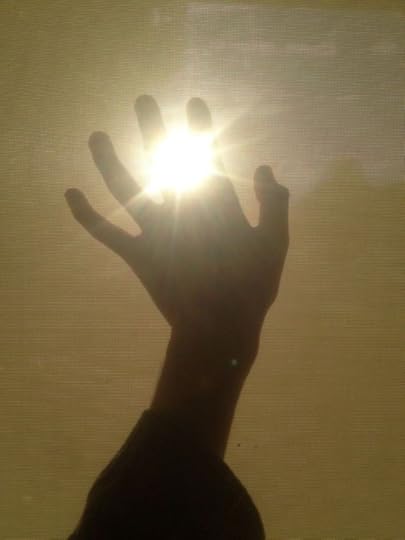
Only consistency soon revealed itself to be a problem. With morning light not coming until 7:00 am, I found it difficult to get up before everyone else. Seven is pretty late in our house, especially during the week, as the dog needs to be fed, my daughter’s needs must be met, etc. And yes, of course, I could have set an alarm, but that would wake up my husband for no good reason and he’s already exhausted and grumpy from his new workload. Some days my “morning pages” would get put off until it wasn’t even morning anymore, at which point there was already a lot of gunk in my head and the stream of consciousness I was trying to summon felt sticky. Or I’d end up not getting to them at all. At a certain point, it would start to feel like there was just too much to do in the day and getting to my “morning pages” too late made them feel indulgent – and not in a good way.
I realized on one haphazard morning about ten days into this creative experiment, that what I needed was more daylight. Or rather, for daylight to come just a little bit earlier. Lo and behold, in one of those acts of synchronicity that tend to follow mergers of intention and action – and thanks to a satirical letter written to The Journal of Paris by American founding father Benjamin Franklin back in 1784 – I got some. To give you a little fun historical window dressing (you know I love this stuff), Franklin’s letter detailed his cockamamie idea of setting clocks one hour ahead in spring and one hour behind in autumn. This was proposed in regard to conserving candles during the winter months and apparently got a big laugh back in the eighteenth century. It was considered so preposterous – even by Franklin himself – that it would take nearly two hundred more years for this scheme to be implemented en masse.
Now, I realize that I’m in a minority when I say that I love Daylight Savings Time. Many find it annoying and unnecessary. Arizona natives often brag about how their glorious state never adopted the looney practice of changing the clocks and never will, thank-you-very-much. But I’ve always had a deep appreciation for Daylight Savings Time, even when I didn’t actually need an extra hour of sun to get motivated.
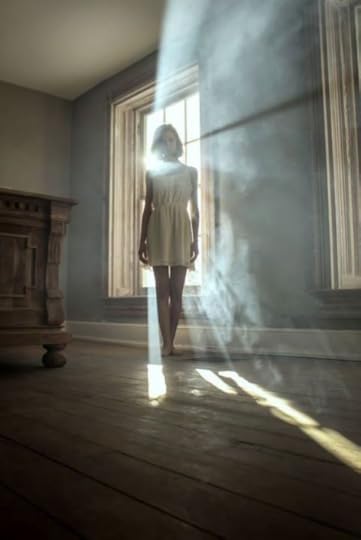
I love the shift in the day and the way it changes my perspective on how the day will unfold in the new season. I love that all of a sudden it gets dark earlier, cold earlier, prompting us to light a fire. The firelight flickers over our living room and infuses the air with the smell of smoke that I find sublime. I can watch the sun set from my office window, giving a natural end to my day, and extending the cozy glamour of night. There’s something about cooking dinner when it’s already dark that makes it feel decadent and special, too.
In the spring and summer, Daylight Savings Time takes the opposite direction. We sleep longer and work later, as the kids are out of school and sports and enrichment activities are no longer packed between four and eight in the evening. Those months are for long evening walks to clear the brain, working or entertaining later into the night. For watching the sun rise from our bedroom window on weekdays and enjoying the extended play of light, as it moves across our house creating shadows and streaks of sun filled with tiny, twinkling specks of dust that look like fairies.
Daylight, when manipulated just a single hour can have a profound effect on our lives, at least in my experience. Just now, in these past few days, it’s made “morning pages” a more natural part of my day, allowing my words to flow more readily, from a place that’s rawer and more instantaneous. It’s an illusion, some might say. The day hasn’t really changed all that much. But illusion is what creativity is all about, and sometimes I need a bit of a mirage to help me construct a fantasy.
To be continued…
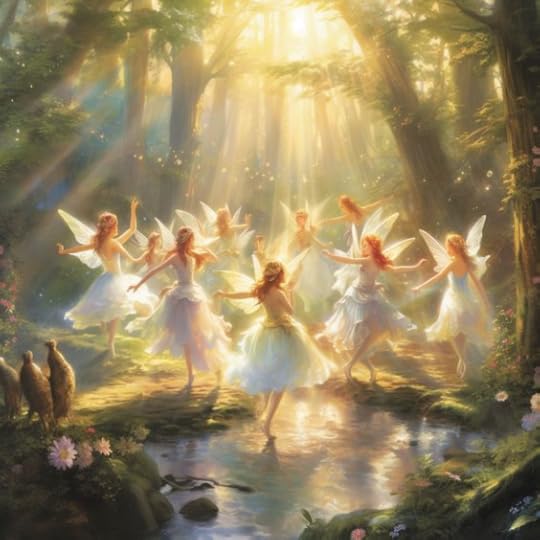
October 20, 2023
Walking Among the Dead
 A reader reached out to me some years ago with a story about Soviet cemeteries. One, in particular, that had been visited by a family friend of his shortly before the fall of the Iron Curtain. This was in response to an essay I’d written about the lost cosmonauts of the Soviet Union, which had stirred up some deep emotions for him.The sudden resurfacing of this memory, this old story, stirred up some deep emotions for me as well. It came right on the heels of the current crisis in Israel-Gaza, although my reader’s story had no connection to terrorism, the middle east, or even the kinds of long-standing conflicts we’re watching play out. His story, in fact, started long after the bodies had been buried, once the outrage, the disbelief, and the wrath had run their course.It was a walk among the dead, you could say. One that ended up taking me far beyond that reader’s original account. It pulled me into my own story, my own memories. While his tale began in a desolate place at the tail end of the Cold War, mine – a sequel of sorts – picked up in a modern city on the brink of a Renaissance, then went on to a rural outpost next to a college town. It finishes, at least I hope, at the brink of infinity.
A reader reached out to me some years ago with a story about Soviet cemeteries. One, in particular, that had been visited by a family friend of his shortly before the fall of the Iron Curtain. This was in response to an essay I’d written about the lost cosmonauts of the Soviet Union, which had stirred up some deep emotions for him.The sudden resurfacing of this memory, this old story, stirred up some deep emotions for me as well. It came right on the heels of the current crisis in Israel-Gaza, although my reader’s story had no connection to terrorism, the middle east, or even the kinds of long-standing conflicts we’re watching play out. His story, in fact, started long after the bodies had been buried, once the outrage, the disbelief, and the wrath had run their course.It was a walk among the dead, you could say. One that ended up taking me far beyond that reader’s original account. It pulled me into my own story, my own memories. While his tale began in a desolate place at the tail end of the Cold War, mine – a sequel of sorts – picked up in a modern city on the brink of a Renaissance, then went on to a rural outpost next to a college town. It finishes, at least I hope, at the brink of infinity.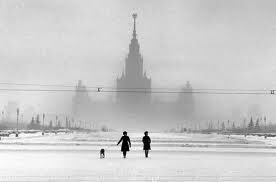 It was during the death throes of the Soviet Union that a guide had taken my reader’s family friend to an odd-looking graveyard somewhere in Russia. At the time, no one knew the USSR was about to collapse, so there were still a lot of looks over the shoulder and careful whispers. My reader’s family friend noticed that many of the graves had bizarre mementos stacked upon them. Things like twisted chunks of metal. Some looked to be pressure gauges, others like pieces of tile or broken glass. He asked about them, discreetly of course, and the guide explained that it was a Cossack cemetery, and that Cossacks have a tradition of placing items on the grave related to the manner of death. If someone died in a car accident, for instance, their car’s steering wheel or part of a bumper would be placed on the headstone. Or if they died fixing their roof…well, you get the picture.The guide went on to reveal that over the hill from the cemetery was the Soviet equivalent of a NASA training center. Near that was another cemetery; this one reserved for the cosmonauts who died in the space program. Intrigued, the family friend asked his guide to take him there, expecting a modest patch of land with a few graves. What he found was a huge cemetery, even bigger than the one they’d been exploring. He said it looked like there were hundreds of graves and each one had what appeared to be a piece of a shuttle laying on or next to the headstone. The guide didn’t elaborate any further but gave a meaningful look to his tourist companion.“So, yes, the Soviet Union didn’t give a crap about the lives of its own citizens,” the reader wrote. “And the lost cosmonauts are real and many.” Men and women who were burned alive upon re-entry, ran out of oxygen, or simply crashed in their shoddily constructed, experimental space craft. In the far north, places like Alaska, Finland, and the Kamchatka Peninsula in Russia, it was not uncommon for people to pick up signals after Soviet launches and hear at first the cries, then the terrified screams of cosmonauts before they went silent.“I wish I could remember where he said the cemetery was,” the reader went on to say. “Maybe somewhere in Siberia? It was a long time ago.”Such a haunting story of ghosts and lies, adventure and tragedy. I would like to one day walk among those headstones with their pieces of misbegotten space crafts. To ponder the childhoods that shaped the dead there, the people who’d loved them and watched them go, knowing, perhaps, that there was little chance of their return. I would want to envisage the dreams that died as the result of ill-conceived programs that were never really built to raise up humanity and see the stars, anyway. Stepping gently over the graves, I would wonder, if in most cases, there was even enough of a body to bury.
It was during the death throes of the Soviet Union that a guide had taken my reader’s family friend to an odd-looking graveyard somewhere in Russia. At the time, no one knew the USSR was about to collapse, so there were still a lot of looks over the shoulder and careful whispers. My reader’s family friend noticed that many of the graves had bizarre mementos stacked upon them. Things like twisted chunks of metal. Some looked to be pressure gauges, others like pieces of tile or broken glass. He asked about them, discreetly of course, and the guide explained that it was a Cossack cemetery, and that Cossacks have a tradition of placing items on the grave related to the manner of death. If someone died in a car accident, for instance, their car’s steering wheel or part of a bumper would be placed on the headstone. Or if they died fixing their roof…well, you get the picture.The guide went on to reveal that over the hill from the cemetery was the Soviet equivalent of a NASA training center. Near that was another cemetery; this one reserved for the cosmonauts who died in the space program. Intrigued, the family friend asked his guide to take him there, expecting a modest patch of land with a few graves. What he found was a huge cemetery, even bigger than the one they’d been exploring. He said it looked like there were hundreds of graves and each one had what appeared to be a piece of a shuttle laying on or next to the headstone. The guide didn’t elaborate any further but gave a meaningful look to his tourist companion.“So, yes, the Soviet Union didn’t give a crap about the lives of its own citizens,” the reader wrote. “And the lost cosmonauts are real and many.” Men and women who were burned alive upon re-entry, ran out of oxygen, or simply crashed in their shoddily constructed, experimental space craft. In the far north, places like Alaska, Finland, and the Kamchatka Peninsula in Russia, it was not uncommon for people to pick up signals after Soviet launches and hear at first the cries, then the terrified screams of cosmonauts before they went silent.“I wish I could remember where he said the cemetery was,” the reader went on to say. “Maybe somewhere in Siberia? It was a long time ago.”Such a haunting story of ghosts and lies, adventure and tragedy. I would like to one day walk among those headstones with their pieces of misbegotten space crafts. To ponder the childhoods that shaped the dead there, the people who’d loved them and watched them go, knowing, perhaps, that there was little chance of their return. I would want to envisage the dreams that died as the result of ill-conceived programs that were never really built to raise up humanity and see the stars, anyway. Stepping gently over the graves, I would wonder, if in most cases, there was even enough of a body to bury.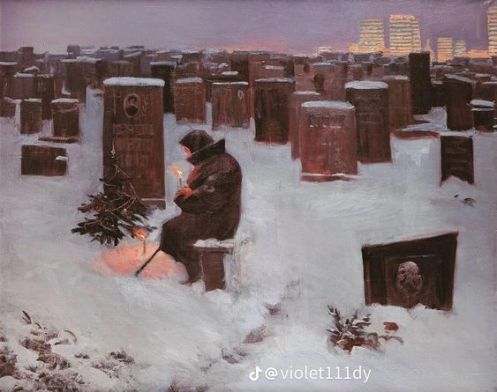 That may seem like a maudlin fantasy, but it’s not one I haven’t indulged in before. I’ve always loved cemeteries. They’re quiet and mysterious. Though filled with the dead, they’re brimming with life. Birdsong, hushed voices, the buzz of insects, the crunch of leaves beneath your feet, the rustle of willow branches as they are blown by a light breeze that feels like a spirit.And then, there are the ghosts they harbor. Maybe not actual ghosts – like the kind you expect to see hovering above the grass, their translucent forms resembling one of those creatures found in the Mariana Trench. I’m talking about the ghosts that lurk in our hearts. Those of unrequited relationships that may not resemble anything even close to love, or the heavy, sweetly aching memories of someone we loved deeply, who we miss profoundly. So much so that they feel like they’re with us in moments of contemplation and recall, giving us advice, telling us we’ll meet again soon.This fascination with cemeteries has been with me all my life, even if I rarely visited them as a child, spying most of my cemetery gates from the window of my dad’s moss green Lincoln. It was only when I was living in Prague as a young adult that I was at last able to forego the car window and properly indulge in my graveyard vagaries, actually walking among the dead. Quite automatically, I found myself going out of my way to cut through cemeteries on a regular basis, sometimes going wildly off course in the process.My first venture into cemetery stalking was the Old Jewish Cemetery. Though it’s one of the largest of its kind, that makes it sound bigger than it is. Certainly, there’s a good number of Jews buried there, but it’s really only a modest graveyard, no greater than your average suburban backyard. In my memory, what it lacked in size, it made up for in devotion. The oldest gravestone – belonging to a rabbi and poet – was from the early 1400s. Its Hebrew inscription looked more like a scribble of pencil by that time, and its stone corners were worn down like the blade of an old kitchen knife. The newest grave wasn’t exactly recent either. It was from 1787, after which city burials were banned for hygienic reasons. Even before that, the bodies in the Old Jewish Cemetery had been buried in layers due to its cramped, urban location, causing the tombstones to lean all over the place like crooked teeth. This gave it a look of artistic distinction, enchantment and quirkiness that I just loved. The dignity of the place, the fact that graves which were over a half a millennium old, many, if not all of which had no surviving descendants, were still being cared for with such diligence, left me with an indelible feeling of awe. I got to know one of the minders a little bit and she instructed me on how to follow the custom of writing prayers on tiny pieces of paper, folding them and fixing them with stones on the grave markers. Some of the prayers were what I would call real – the please help me love better and be better ones – while others were more superficial – please help my theater company succeed, and so on. The minder there told me it didn’t matter what I wrote, only the intention in my heart.My visits there, however, were short-lived. Something of a pilgrimage site for Jews from around the world, the place became crowded once Prague tourism became the thing. After the Jewish Museum began to charge for entry, and for good reason – they had to keep up the place and repair the wear and tear caused by visitors – I stopped going.
That may seem like a maudlin fantasy, but it’s not one I haven’t indulged in before. I’ve always loved cemeteries. They’re quiet and mysterious. Though filled with the dead, they’re brimming with life. Birdsong, hushed voices, the buzz of insects, the crunch of leaves beneath your feet, the rustle of willow branches as they are blown by a light breeze that feels like a spirit.And then, there are the ghosts they harbor. Maybe not actual ghosts – like the kind you expect to see hovering above the grass, their translucent forms resembling one of those creatures found in the Mariana Trench. I’m talking about the ghosts that lurk in our hearts. Those of unrequited relationships that may not resemble anything even close to love, or the heavy, sweetly aching memories of someone we loved deeply, who we miss profoundly. So much so that they feel like they’re with us in moments of contemplation and recall, giving us advice, telling us we’ll meet again soon.This fascination with cemeteries has been with me all my life, even if I rarely visited them as a child, spying most of my cemetery gates from the window of my dad’s moss green Lincoln. It was only when I was living in Prague as a young adult that I was at last able to forego the car window and properly indulge in my graveyard vagaries, actually walking among the dead. Quite automatically, I found myself going out of my way to cut through cemeteries on a regular basis, sometimes going wildly off course in the process.My first venture into cemetery stalking was the Old Jewish Cemetery. Though it’s one of the largest of its kind, that makes it sound bigger than it is. Certainly, there’s a good number of Jews buried there, but it’s really only a modest graveyard, no greater than your average suburban backyard. In my memory, what it lacked in size, it made up for in devotion. The oldest gravestone – belonging to a rabbi and poet – was from the early 1400s. Its Hebrew inscription looked more like a scribble of pencil by that time, and its stone corners were worn down like the blade of an old kitchen knife. The newest grave wasn’t exactly recent either. It was from 1787, after which city burials were banned for hygienic reasons. Even before that, the bodies in the Old Jewish Cemetery had been buried in layers due to its cramped, urban location, causing the tombstones to lean all over the place like crooked teeth. This gave it a look of artistic distinction, enchantment and quirkiness that I just loved. The dignity of the place, the fact that graves which were over a half a millennium old, many, if not all of which had no surviving descendants, were still being cared for with such diligence, left me with an indelible feeling of awe. I got to know one of the minders a little bit and she instructed me on how to follow the custom of writing prayers on tiny pieces of paper, folding them and fixing them with stones on the grave markers. Some of the prayers were what I would call real – the please help me love better and be better ones – while others were more superficial – please help my theater company succeed, and so on. The minder there told me it didn’t matter what I wrote, only the intention in my heart.My visits there, however, were short-lived. Something of a pilgrimage site for Jews from around the world, the place became crowded once Prague tourism became the thing. After the Jewish Museum began to charge for entry, and for good reason – they had to keep up the place and repair the wear and tear caused by visitors – I stopped going.
 By this time, I was hooked on the dead. Thankfully, there were several notable cemeteries to choose from in Prague, so I changed up my walking routine. Whereas I used to visit the Old Jewish Cemetery on my walk into the center of town, I began going a more roundabout way home from the center – and by roundabout, I mean adding a good hour onto my journey on some days. It was well worth it, as it took me on my all-time favorite cemetery stroll to Vyšehrad Cemetery near the original castle in the Vinohrady district.It’s a place that is nothing short of a work of art, and filled with some of the most beautiful monuments you’ll ever see: outstretched palms, as white as alabaster, bursting from a hunk of marble, a lone cherub perched upon a tombstone – his wings down like the ears of a chastened dog, a copper sculpture of a weeping woman with her eyes clenched in agony, her hands held tightly over her ears, an enormous triumphant angel keeping watch over a significant family crypt, daring any evil spirits to take her on.It was not as much of a place for piety and wishes like the Old Jewish Cemetery was, but I felt in excellent company there, nonetheless. In Vyšehrad Cemetery, I was at one of the world’s best spiritual cocktail parties, and well aware it was likely the only time in my life when I would almost be able to rub elbows with celebrated notables, initiating imaginary conversations about life and art. I was among the composers Antonín Dvořák and Bedřich Smetana, could casually pass by the painter Alfonse Mucha, and commune with writer Karel Čapek, whose 1920 global sensation of a play, RUR, was performed by my own Prague theater company. Božena Němcová, the 19th century fairytale author who wrote tales inspired by her childhood in a Czech village was there, too. My late grandmother used to read me her stories when I was a girl, and so much of what I view as Czech – in myself and others – was inspired by Němcová’s stories. I can’t help but to see them in my own work.And I could take a seat next to the symbolic grave marker of Czech politician Milada Horáková and contemplate her courage. A member of the underground resistance movement during World War II, Horáková would endure a stint in a Dresden prison, but ultimately it would be the Soviets who would kill her. Refusing to relinquish her voice to the communists, she was convicted on fabricated charges of conspiracy and treason during a shameful show trial and sentenced to death. Pleas from the likes of Albert Einstein, Eleanor Roosevelt and Winston Churchill fell on deaf ears, but the woman who was called “The only real man in the Czech senate” went to her death with dignity.“I have lost this fight, but I leave with honor,” she said. “I love this country, I love this nation, strive for their wellbeing. I depart without rancor towards you. I wish you, I wish you…”Executed by hanging, they say she was strangled for more than thirteen minutes, and her remains were dumped into a mass grave at Ďáblice cemetery on the outskirts of the city.Gone, and in a gruesome and obscene way, but not forgotten. When I lived in Prague, my flat was just off a boulevard that bore her name.
By this time, I was hooked on the dead. Thankfully, there were several notable cemeteries to choose from in Prague, so I changed up my walking routine. Whereas I used to visit the Old Jewish Cemetery on my walk into the center of town, I began going a more roundabout way home from the center – and by roundabout, I mean adding a good hour onto my journey on some days. It was well worth it, as it took me on my all-time favorite cemetery stroll to Vyšehrad Cemetery near the original castle in the Vinohrady district.It’s a place that is nothing short of a work of art, and filled with some of the most beautiful monuments you’ll ever see: outstretched palms, as white as alabaster, bursting from a hunk of marble, a lone cherub perched upon a tombstone – his wings down like the ears of a chastened dog, a copper sculpture of a weeping woman with her eyes clenched in agony, her hands held tightly over her ears, an enormous triumphant angel keeping watch over a significant family crypt, daring any evil spirits to take her on.It was not as much of a place for piety and wishes like the Old Jewish Cemetery was, but I felt in excellent company there, nonetheless. In Vyšehrad Cemetery, I was at one of the world’s best spiritual cocktail parties, and well aware it was likely the only time in my life when I would almost be able to rub elbows with celebrated notables, initiating imaginary conversations about life and art. I was among the composers Antonín Dvořák and Bedřich Smetana, could casually pass by the painter Alfonse Mucha, and commune with writer Karel Čapek, whose 1920 global sensation of a play, RUR, was performed by my own Prague theater company. Božena Němcová, the 19th century fairytale author who wrote tales inspired by her childhood in a Czech village was there, too. My late grandmother used to read me her stories when I was a girl, and so much of what I view as Czech – in myself and others – was inspired by Němcová’s stories. I can’t help but to see them in my own work.And I could take a seat next to the symbolic grave marker of Czech politician Milada Horáková and contemplate her courage. A member of the underground resistance movement during World War II, Horáková would endure a stint in a Dresden prison, but ultimately it would be the Soviets who would kill her. Refusing to relinquish her voice to the communists, she was convicted on fabricated charges of conspiracy and treason during a shameful show trial and sentenced to death. Pleas from the likes of Albert Einstein, Eleanor Roosevelt and Winston Churchill fell on deaf ears, but the woman who was called “The only real man in the Czech senate” went to her death with dignity.“I have lost this fight, but I leave with honor,” she said. “I love this country, I love this nation, strive for their wellbeing. I depart without rancor towards you. I wish you, I wish you…”Executed by hanging, they say she was strangled for more than thirteen minutes, and her remains were dumped into a mass grave at Ďáblice cemetery on the outskirts of the city.Gone, and in a gruesome and obscene way, but not forgotten. When I lived in Prague, my flat was just off a boulevard that bore her name.
 More recently, I’ve begun visiting a sparse, little cemetery just down the road from our house in Virginia. It’s an old family burial ground of sorts that sits on a vacant lot that looks to be well shy of an acre. Impeccably tended to by people I presume are local family members, many of the graves have fresh flowers when I visit.There are several gravestones for Confederate soldiers, so weather-worn you can barely read the names anymore. One of those tombstones – without being touched – spontaneously, and inexplicably, tipped over onto my youngest child a few years back, pinning the then five-year-old girl to the ground. We all joked that the ghost of a Stonewall Jackson relative was giving us a message: “Yankees go home!” Near the felled tombstone, five consecutive engraved stones no bigger than dinner plates mark the final resting places of children who belonged to a single couple. Most of them died before their second birthday – only one living to the age of nineteen. It’s hard to imagine that level of loss, though at the time, more than one-hundred-thirty years ago, it wasn’t uncommon. And yet those parents went on, long outliving their children, their own epitaphs citing their love of family and each other.
More recently, I’ve begun visiting a sparse, little cemetery just down the road from our house in Virginia. It’s an old family burial ground of sorts that sits on a vacant lot that looks to be well shy of an acre. Impeccably tended to by people I presume are local family members, many of the graves have fresh flowers when I visit.There are several gravestones for Confederate soldiers, so weather-worn you can barely read the names anymore. One of those tombstones – without being touched – spontaneously, and inexplicably, tipped over onto my youngest child a few years back, pinning the then five-year-old girl to the ground. We all joked that the ghost of a Stonewall Jackson relative was giving us a message: “Yankees go home!” Near the felled tombstone, five consecutive engraved stones no bigger than dinner plates mark the final resting places of children who belonged to a single couple. Most of them died before their second birthday – only one living to the age of nineteen. It’s hard to imagine that level of loss, though at the time, more than one-hundred-thirty years ago, it wasn’t uncommon. And yet those parents went on, long outliving their children, their own epitaphs citing their love of family and each other.
 Beloved husbands, beloved wives, dear sisters, treasured brothers. The brave, the strong, the ready and willing, the funny, the loving and lovely. Only the best attributes of the dead are engraved for posterity. As it should be, even with the worst sons of bitches. In death, we always need to hold out hope…even if it’s only for forgiveness.Because despite their best efforts, terrible people and their terrible deeds leave behind more than tears, scars and gravestones. They bring to the surface byproducts of death and suffering that we should never take for granted. Those of empathy, gratitude, self-reflection and self-reckoning, rebuilding, reimagining, plus a rediscovered appreciation for truth and beauty.And so, we end this story with something of a cliffhanger that leaves room for redemption and life everlasting. Even the evilest acts bless the world with meaning. The black-hearted, the misguided, the desperate, the poetic, the misunderstood, the holy continue to tell us their stories, helping us somehow make sense of it all.One day, people will be walking among the dead of this latest tragedy, too, saying prayers, having spectral conversations, retelling tales of bravery and self-sacrifice. With some luck, divine intervention, perhaps, they may be explaining to their children that these deaths, which seemed so senseless at the time, eventually helped bring about a hard-won peace.
Beloved husbands, beloved wives, dear sisters, treasured brothers. The brave, the strong, the ready and willing, the funny, the loving and lovely. Only the best attributes of the dead are engraved for posterity. As it should be, even with the worst sons of bitches. In death, we always need to hold out hope…even if it’s only for forgiveness.Because despite their best efforts, terrible people and their terrible deeds leave behind more than tears, scars and gravestones. They bring to the surface byproducts of death and suffering that we should never take for granted. Those of empathy, gratitude, self-reflection and self-reckoning, rebuilding, reimagining, plus a rediscovered appreciation for truth and beauty.And so, we end this story with something of a cliffhanger that leaves room for redemption and life everlasting. Even the evilest acts bless the world with meaning. The black-hearted, the misguided, the desperate, the poetic, the misunderstood, the holy continue to tell us their stories, helping us somehow make sense of it all.One day, people will be walking among the dead of this latest tragedy, too, saying prayers, having spectral conversations, retelling tales of bravery and self-sacrifice. With some luck, divine intervention, perhaps, they may be explaining to their children that these deaths, which seemed so senseless at the time, eventually helped bring about a hard-won peace.
 You can read my essay about the lost cosmonauts of the Soviet Union here, if you’re interested.
You can read my essay about the lost cosmonauts of the Soviet Union here, if you’re interested.
September 22, 2023
Remembering The Count of Florida’s Panhandle
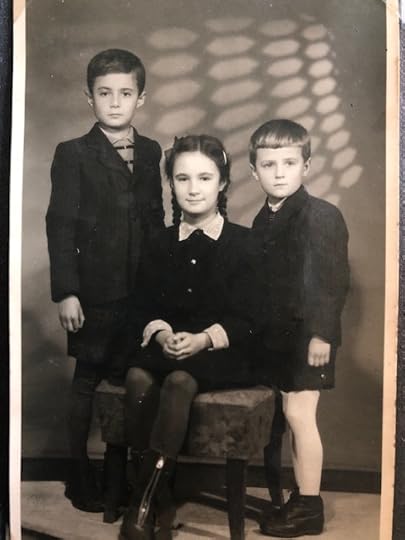 My father (left) and his siblings
My father (left) and his siblings“I am a Cejka,” my father would often announce, as if all of us should know what that means, other than recognizing that it is his family name.
The communists had taken over Czechoslovakia when he was a boy, stealing his family’s estate and fortune, but my father continued to carry with him a sense of pride about being a Cejka. One he took with him from the cold water flat he shared with my mom in Prague, all the way to his simple, one-room rentals in Chicago. He strode the public beaches of his retirement state of Florida with the imperious detachment of a noble surveying his lands.
As a child, I had a fascination with my father, and this high-falutin’ family of his. The dichotomy between the way he lived his life, and the Downton Abbey circumstances of his birth couldn’t have been starker, and his eccentric behaviors were the stuff of legend in the Czech immigrant community.
How he hated to bathe.
His pathological obsession with being in the outdoors.
His extreme miserliness.
The crazy sh*t he would say.
The stories about him were the only way I knew him throughout most of my girlhood. My parents divorced when I was a baby, and right around when I entered Kindergarten, my mom married a man who would raise, and later adopt me, effectively erasing my father’s physical presence from my life.
I did have some tangible memories of visits with my “bio-dad,” as I called him. I remembered that he introduced me to banana ice cream and taught me how to ski, for instance. But between about age five and age eighteen, I saw him only once.
That visit was a strange and awkward lunch orchestrated by my mom, when I was about twelve years old. She spent much of the hour or so we sat in a nearly empty diner, specifying all the ways in which I resembled the Cejka family – my brow, my jawline. She pointed to the knuckles on my hand, comparing them to my father’s. I felt a bit like a “thing” at that lunch – constantly being referenced, but never really engaged.
“You nervous?” I remember my father saying, and then he laughed.
Until that day, my mother had advocated for a persona non grata policy towards her ex-husband and father of her children. With no further explanation, she went back to that policy, as if our weird little interlude never happened.
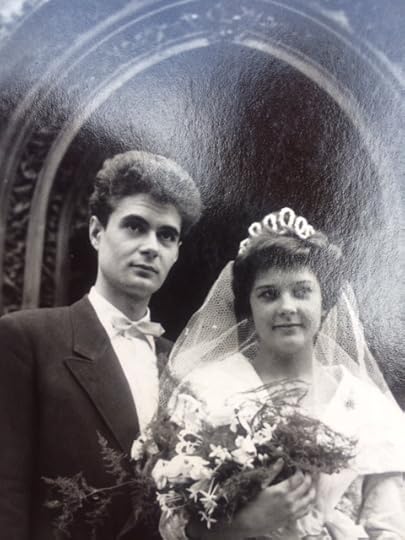 My parents on their wedding day
My parents on their wedding dayThen, out of the blue, when I was eighteen, my brother called me up with a proposition.
“Want to have lunch with Tata?” he asked me. “You don’t have to, but I should tell you I’ve started seeing him again, and I thought you might find it interesting.”
I thought about it for a few seconds, just to assess where my gut feeling stood on the prospect of opening what was, potentially, a can of worms. I knew my mom hoped we would never see our father again, and she truly had not a single, positive word to say about the man. She wasn’t the only one. And I’d tried this lunch business one time before.
Yet without hesitation, I said, “Yes.”
And so began a rather curious relationship. A father-daughter bond that was based not on shared memories, communal values, or anything resembling love. It was a bond of family history, of missed opportunity, of ghosts, and of oddities. It was also, at its core, an animal bond of blood.
 My father, brother, and me, along with our cousin’s young daughter in Slovakia
My father, brother, and me, along with our cousin’s young daughter in SlovakiaAfter a first, self-conscious meeting in my father’s attic apartment in suburban Chicago, where I was shown family photos, and my father strummed Czech folk songs on his guitar, we settled into a routine that suited us both: dinner and a movie. Typically, my father and I would meet at a Czech restaurant, since that’s the only food he liked, and then rifle through the theater listings.
Our dinner conversations were quirky, but easy, and mostly centered around his visits to the old country, nature, opera (but only if it was Czech opera), and the Czech immigrant dances he liked to frequent.
As we moved on from restaurant to cinema, the conversation would continue as if we hadn’t changed venues at all.
Uninterested in stories that weren’t by or about Czechs, which is the vast majority of them, my father would speak loudly about random topics during our film of choice, provoking shushes and dirty looks that he was completely oblivious to. In a packed theater for the 1995 Brad Pitt vehicle “Seven,” things almost came to blows when my father wouldn’t stop complaining about the absence of “beautiful nature” in the film.
“Look at it – it is terrible,” he called out. “There are no mountains, no lakes, no nothing! Just ugliness!”
Then there were the “dates” when we wouldn’t even make it to the movies at all. If the weather was good, my father would pull over to any body of water – no matter how dubious – strip naked, and go for a dip.
“Come in,” he would call.
I’d point to the prominent “No Swimming” sign and remind him that I didn’t bring my suit. My father would shrug and splash around, delighting in this interlude as freely as if he were a water bird.
Shouts of “Hey, asshole! Put some clothes on!” would blast out of car windows, and he wouldn’t even look up to see where they’d come from. He was in his own world, and despite the occasional embarrassment, I admired that about him. My father was a man without self-consciousness – an animal in the wild. It was only when he was outdoors – swimming, lying in the grass, foraging for mushrooms – that he felt any real kinship, a relationship to something other than his routine.
It was nice to see him happy.
On the rare occasions when my father would attempt to give me life advice, his counsel would take on the perspective of a 1950s public service announcement voiced by a crotchety Count Drakula.
Worried that I was twenty-nine and still single, he once berated me in front an entire restaurant. Banging his hand on our table, he shouted, “You have to face the facts! Women’s brains are smaller than men’s, and after age thirty you won’t be marketable anymore. You will dry up and your Cejka genes will die!”
“Poor, dry, mini-brained me – whatever will I do?” I sighed, putting my hand to my forehead like I was in need of a fainting couch.
“It’s not funny! This is your life!” He cried. He was in genuine anguish about the state of my affairs as a single woman and small business owner. My life as a college graduate and chocolatier, at the time, seemed to him to be a dead end, a failure.
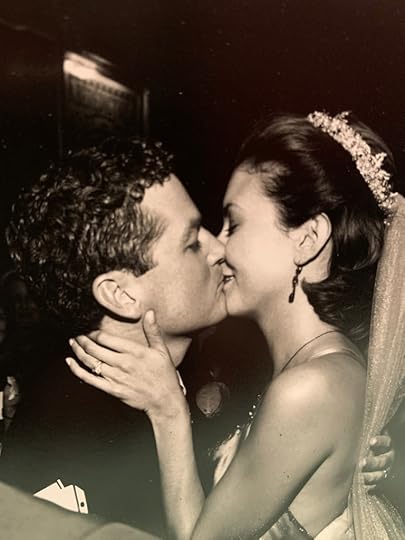 A day of great relief for my father
A day of great relief for my fatherBy the time I married, and my children were born, my father had retired from his job as an electrical engineer and would drive down to see my family at our home in Virginia. His visits were characterized by their surprise nature – he never called in advance to tell us he was coming – and his hygiene. On his first drop-in to our new house, in our new state, I found that he’d stopped bathing entirely, except in lakes or streams.
“I like to smell like the earth,” he was fond of saying. “And I don’t have to go to work anymore, so who cares?”
“People who have to sit next to you care,” I told him.
But his unusual behavior was always tinged with a bit of romance and culture with a capital C. He would play passionate Dvořák concertos on our piano – beautifully – only he’d do it at 2:00 a.m. and seem genuinely perplexed when I would come downstairs and ask him to give it a rest.
“The kids have school tomorrow, Tato.”
“They should listen to the classical Czech composers,” he’d say, dismissing me. “They are the best.”
“Well, of course,” I said. “But couldn’t they do it in the afternoon?”
My middle daughter, Charlotte, never quite got over the fact that her grandfather gave her a dirty, broken moose keychain that he found on the side of the road, for her eighth birthday. “It works perfectly fine,” he said.
Or that he kept calling her Scarlett, no matter how many times she corrected him.
Yet once a year, he sent us a $300 check, specifying that it was to be distributed equally between our three children – Eamon, Scarlett, and Josephine, and my husband and I were not to use any of it for ourselves.
“Do you honestly think I would steal the Christmas money you sent to our kids?” I teased.
“How would I know?” he said. “I didn’t raise you. And you are only half Cejka, although you seem to have many of our excellent qualities.”
 The midnight concert visit
The midnight concert visitThose “excellent qualities” he identified as “being cleverish,” my writing ability (a 19th century Cejka was sort of the Czech Emerson), and my enthusiasm for physical fitness (Cejkas are hearty, he told me). While our actual personalities had all the common properties of chalk and cheese, I couldn’t help appreciating his cockamamie perspective on things.
“I can’t believe you see that idiot!” my mom would grumble.
She considered the day her divorce was granted as the happiest day of her life and couldn’t fathom why we’d reconnected with our father. Especially when she felt like she’d gone to such lengths to spare us from him.
“There’s something wrong with that man,” she said. “Everyone knows it.”
She had a point. My brother, a clinical psychologist, believed a “right brain disorder” could have been at the root of our father’s more peculiar behaviors. Ones that got him into trouble here and there – getting a beer bottle broken over his head or getting fired for insulting his boss. He had a way of blurting out the sorts of observations most people keep to themselves. If they know what’s good for them. Things like, “Your wife is very ugly, but perhaps she is a good cook, so it doesn’t matter to you.” (Yes, he actually said that.)
 Cejka family pyramid, Czechoslovakia 1975
Cejka family pyramid, Czechoslovakia 1975His candor was second only to his miserliness, and the two often found themselves in good company. My father was known to crow about how he’d gotten out of paying child support by letting my step-dad adopt my brother and me. In the same breath, he’d tell me how he felt cheated out of a relationship with us, and blamed my mother for that. Not for bad-mouthing him, but for reporting his delinquent child support payments to the court.
Yet, he continued to be in love her for the rest of his life, and wouldn’t even consider remarrying, despite several long-term relationships.
“I am already married,” he’d say. “And a wife costs money.”
 My father at our place in Virginia a few years ago
My father at our place in Virginia a few years agoMy father took a great deal of pride in the fact that my brother and I had continued the Cejka line, yet our efforts to help him integrate into our lives, and into the lives of his grandchildren, largely fell flat. Or rather, they would begin with a certain level of enthusiasm, then fade away like a temporary tattoo. While our father indicated he wanted to be a part of our lives, and was clearly lonely, his solitary nature chaffed at the idea that he might be held responsible for something as simple as remembering birthdays.
In the last few years of his life, he became particularly distant from us, communicating mostly by intermittent email, with his surprise visits becoming fewer and farther in between. Still, we all kept trying – clumsily perhaps. None of us were inclined to give up, sever the tie. In the absence of love, we had been given a sense for the unorthodox gift of a misfit relative. Of the tolerance and self-control a difficult person forces us to utilize, internalize. How they help us grow and provide comfort and companionship to a person who genuinely doesn’t know how to accept such an offer. That was enough.
 The look on his face here speaks of loneliness to me
The look on his face here speaks of loneliness to meThis was why, when I took my then thirteen-year-old son, Eamon, to Prague on an adventure to the old country, I was determined for us to spend a day or two with my father. Even if I knew those would be long days, indeed. Especially for my kid.
My father, who by this point was dividing his time between the Czech Republic in the summer months, and Florida in the winter, wanted very much for us to stay at his house in his birth village, Třebíz.
Except that the place was run down, smelled of mold and animal waste. Neither the kitchen nor the bathrooms worked properly, and only the yard, which was nice and contained an orchard, was in good condition.
“Please let’s not stay here,” my son begged. “It’s creepy.”
Notwithstanding my usual can-do attitude towards my father, I caved without a second thought, and I don’t think my father ever quite forgave me for staying with family friends close by. He felt I’d robbed him of time with his grandson and chose outsiders over blood.
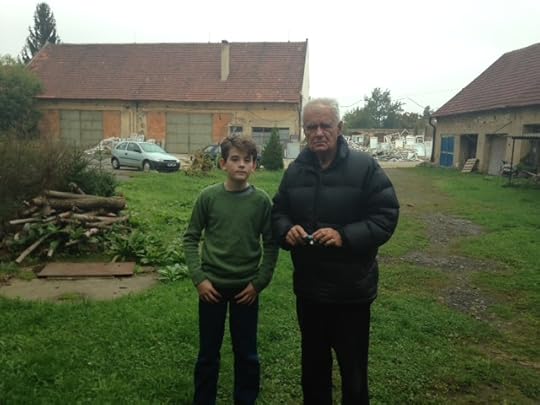 My son and father in Třebíz
My son and father in TřebízBut we had some magic with him on that trip, too. At a bookstore reading of my novel, The Bone Church, a historical thriller set during the Cold War, my father was the star of the Q & A session. For the first time, he recounted his version of my parents’ escape from the communists, and he did it with a vim and vigor I’d never witness in him outside of nature.
He told the crowd how they’d plotted to obtain permission to take a vacation to the Black Sea, after they’d learned their train from Prague had a stop on the porous border between Yugoslavia and Italy.
Just like in the movies, he found himself crawling to freedom through a field of grass, until he came upon a pair of boots. His eyes followed all the way up the body of a pugnacious border guard, and he came face to nozzle with a gun, nearly pissing himself.
“We claimed to be lost,” he cried. “Saying we were in Yugoslavia on vacation and didn’t know our way around. And your mother, she cried and beg, and she was nice looking, and I think they feel sorry for her. They yell and point their fingers – ‘If we see you here again, you’re going on the next train back to Prague, and they’ll probably throw you in prison for a long time.’ It was all very scary.”
But my parents didn’t give up. My mother traded all of her money and belongings for an Italian couple’s passports. She did her hair like the woman, and my father wore a hat. My brother was too young to need identification and was instructed by our parents to pretend to sleep.
“Thank God the border guards didn’t speak Italian to us,” my father said. “I would have no idea what he was talking about and we would be in jail for twenty years.”
That great escape was the one true triumph of their marriage. Possibly the only time they’d worked together for a desired outcome and emerged successful. And he savored it.
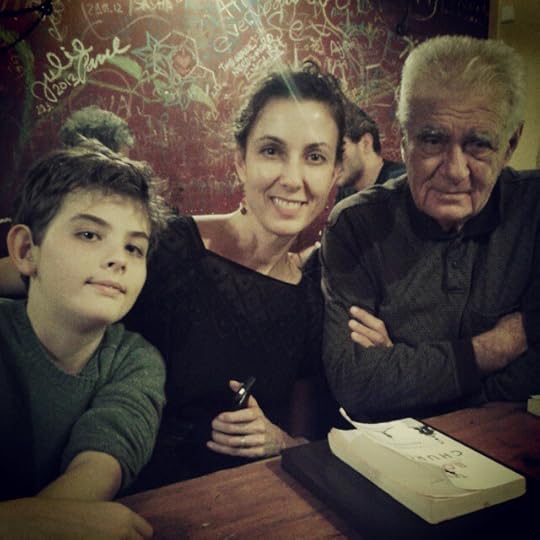 My son, my father, and I, at my book reading in Prague
My son, my father, and I, at my book reading in PragueIn the years following our Prague trip, my father became more untethered. During his summers in his birth country, he lived in his village house, which according to my cousin, had become unlivable. It had been infested by a family of voles and the kitchen and bathrooms smelled awful and were completely derelict by then. My cousin offered to fix up the place – knowing how tight with a coin he was – but my father refused.
“It’s fine. There’s nothing wrong with it,” he told her.
His winters in Florida were spent entirely in the outdoors, mostly on beaches or in state parks. My brother and I tried to convince him to buy a small apartment, or rent one, but he was adamant that no, he preferred to sleep in his car. He wanted to be free, he told us, and he thought an actual home was a huge waste of money.
“My father has become, for all intents and purposes, homeless,” I told my husband.
With the onset of COVID, my father had to cancel any plans to visit Prague, and was fixated on his health, frightened of getting the virus. While a very fit eighty-one, he’d been having some age-related health issues that concerned him, too. Once again, I asked him to visit us, but he refused.
“I am old man, now,” he said. “It is an inconvenience to me to have to drive up there.”
“You could fly,” I told him. “We’ll buy you a ticket.”
But that was a no-go.
I’d send him pictures of my family, and he’d remark about how big my children were getting, occasionally identifying qualities that he recognized as having Cejka origins – curly hair, dark skin, the thick, determined brow that all of us seem to share. But he never gave much information about himself, even when I made specific inquiries about his life and sent him a detailed update of our exploits.
My father seemed melancholy. An email I received from him on September 14, 2020, read, “I hate this Corona virus and it is worse for singles like me.”
“I know,” I replied. “I hope we get a vaccine soon.”
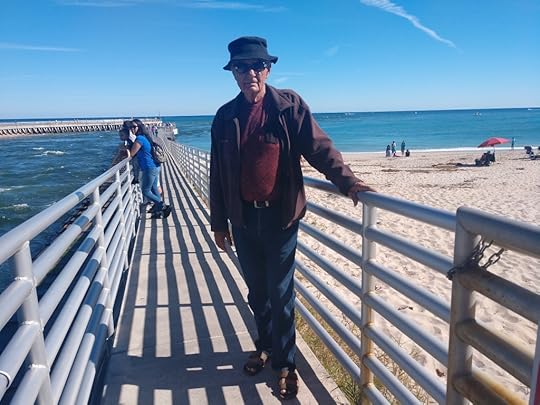 My father emailed me this picture from Boyton Beach in fall, 2020
My father emailed me this picture from Boyton Beach in fall, 2020In mid-November of the same year, a couple of weeks after he’d last reached out to us, a police officer came to my brother’s house near Gainesville. Our father had been tested for Covid and had left my brother’s address with the clinic. The officer was concerned because the clinic had indicated he’d seemed quite ill and had indeed tested positive for the virus.
After a missing endangered persons report was filed, our father was finally located through his cell phone, and the police did a drive-by of where he was staying: a rented, one room camper on a country property, just a dash from a small lake he could bathe in.
Delirious and dehydrated, he was taken to the COVID unit in a local hospital, and from then on, our only contact was with the staff that was caring for him.
Although he was in pretty bad shape when he arrived, the doctors still told us they thought he would pull through, given how strong and fit he was. They dubbed him “The Flying Wallaby” for his propensity to lift himself up by the guard rails on his bed. It was when he started doing somersaults in that bed that the doctors finally had to sedate him and take more drastic measures. But they were to no avail.
A week later, my father died.
The nurse who had taken care of him in his last days held his hand when they took him off the ventilator. She assured us that he slipped away peacefully, and almost immediately.
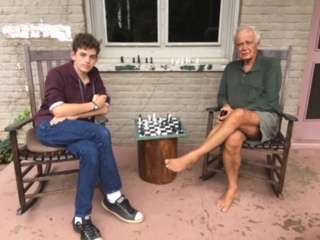 My father’s final visit with my family
My father’s final visit with my familyAlthough our father’s presence in our lives had been sparse and floundering, his sudden absence was destabilizing and unexpectedly sad, for both me and my brother.
“He was such a part of your story,” my best friend told me.
He was.
We wanted to know what happened in the days preceding our father’s illness, knowing how fastidious he had been about his health, if not his hygiene. He’d had a full work-up at the Mayo Clinic just a couple of years prior, and had an appointment for a colonoscopy scheduled for the week after his death. He mentioned COVID in every one of his brief updates, so he was clearly aware and motivated to be cautious.
My sister-in-law did some digging.
She learned that a bar he’d frequented had been closed due to a COVID breakout, and that was likely where he’d caught the virus. My father had always loved dive bars and was an odd-ball regular character at a couple of places in the panhandle that he frequented. A place called Catfish Jack’s was his favorite.
Turned out, my father’s fear of COVID had not been enough to keep him from trying to stave off his loneliness. He couldn’t resist going into bars, which apart from nursing homes, had shown some of the highest rates of transmission. Family was important to him objectively, from a genetic standpoint, and he may have longed for us all from time to time, but when push came to shove, he felt most comfortable in the company of virtual strangers.
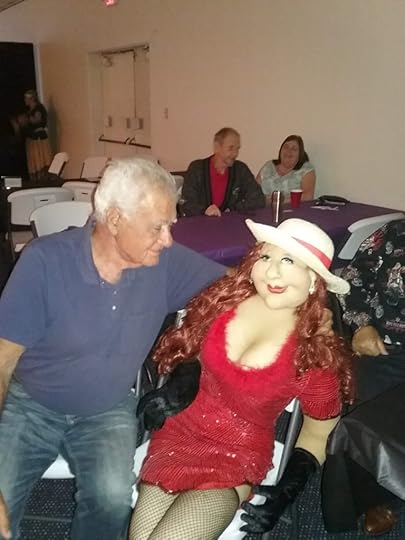 My father and a lady friend at a Czech dance a few years ago
My father and a lady friend at a Czech dance a few years agoStill, it breaks my heart that he died without any of us at his bedside. Blood relations, as he would say. Cejkas. I suppose it’s some consolation that my brother and I were always afraid that his end would be worse. That he might be found weeks after his death – in a national park somewhere, his body already decomposing.
We worried he could fall victim to foul play, as he rarely locked the small van that was his home most nights – a vehicle he’d tricked out with a foam mat and DIY screens that allowed him to roll down the windows to allow for fresh air while keeping out the bugs. He liked to lay there listening to Czech opera on the stereo, looking up at the stars through his moon roof.
When my brother and his wife went to get a look at his rental camper, the last place he’d actually lived for any period of time, they said it was even farther out in the middle of nowhere than they thought. So far out that everyone who saw them driving in came to get a look at the outlanders in their midst. Upon closer inspection of his living conditions, they discovered my father’s car was filthy, as was the camper. He’d been living in squalor.
My sister-in-law was able to hold it together until she and my brother got back into their car and started driving away. Then she broke down in tears.
“I’m actually going to miss the crazy bastard,” she told me on the phone later.
That’s generous of her, considering that my father had always flagrantly excluded her children from her first marriage from any attention or gift giving. My brother had adopted his wife’s kids, raising them alongside his biological children as if they were his own, but that didn’t hold much water for our father.
“They’re not Cejkas,” he’d said.
 Part of the one-time Cejka family estate in Třebíz, CZ
Part of the one-time Cejka family estate in Třebíz, CZWe decided to cremate our father’s remains. It made sense on many levels. Covid-wise, certainly, the fact that our father wasn’t religious played a role, and that he valued the least expensive option. He stated as much in his will.
Our cousin in Slovakia requested half of his remains, so she could bury them in Třebíz. We thought this was an excellent compromise and would honor the things he most loved.
As soon as we’re able, my brother and I pledged, that with our families, we would scatter our portion of his ashes in the nature areas he most enjoyed frequenting in Florida. Where he thrilled to the fresh air, the cool water, the sand between his toes, to suck on blades of grass, and nap in the shade of a tree heavy with leaves. He loved those things more than people.
The other half of him will be with his blood in the Cejka family burial ground. Because he loved being a Cejka most of all.
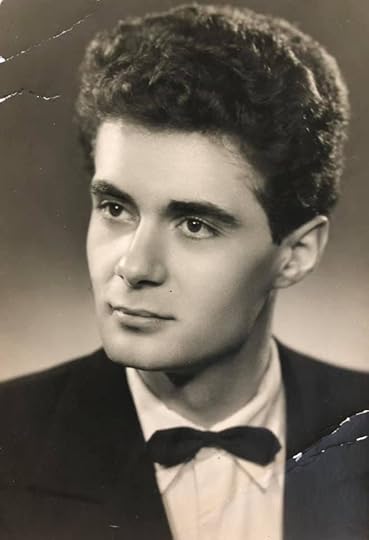 Jan Cejka, RIP
Jan Cejka, RIP
September 8, 2023
Going All the Way

Some years ago, a writer friend of mine – a fun blonde with surfer-mom waves in her hair and a smile that made everyone in the room feel like it was for them and them alone – was having a hell of a year. In a good way. She’s a Romance author who’d been writing in just about every Romance sub-genre, including erotica. This was back when “Fifty Shades of Grey” was all the rage, and my friend’s fairly obscure BDSM series suddenly took off like a rocket. Once readers discovered her work, they didn’t stop there. Within a couple of months, nearly all of her romances, regardless of genre, became bestsellers.
It’s such an inspiring story, isn’t it? My heart still goes pitter-pat, like I’m reading one of her romances, when I think about it.
This woman had put her heart and soul into her romances, only making a meh living until gold struck. Yet even during her barely making it years, giving up on her vision was a non-starter. She felt like she was making a difference in her readers’ lives. They told her so – often writing her long letters revealing not only how much joy she gave them, but how much hope. Many thanked her for relieving their loneliness.
When she wrote about people and fetishes that were so far from her own tastes and experiences, she did it with empathy, imagination, and authenticity. She infused her stories with meaning, and her readers picked up on that. It was why, in a crowded Romance market, they kept coming back to her novels. And why, given the right market forces, her books were able to find a broader audience.

All of us storytellers hope for that moment to converge on us. For our cult followings to become massive fandoms, our personal and literary obsessions to ring a bell – maybe bang a gong – that resonates far and wide.
It’s why many of us shy away from writing outside of our usual scope, even when we’re bored and restless, or engage in frenetic jumps from genre to genre in the hopes of hitting a cultural movement. Walking that line is hard, and we writers are always stalking our online groups, going to conferences, and consulting with each other to make sure we’re making wise choices.

“You should write Romance,” my “overnight success” friend told me one day. I’d been telling her how, despite being a thriller writer, my essays about love had always elicited such strong reactions from readers – even the guys. They were and remain my most popular posts, by far.
“You’re made for it,” she said. “And don’t shy away from the dirty stuff. Readers love it when we leave the bedroom door wide open.”
I had no doubt she was right. And I wasn’t just shooting the breeze with her about blogging that day, I was seeking her guidance. I’d been having this niggling feeling that I needed to take a left turn with my writing, challenge myself, do something new. This was back when I was first starting to assemble some ideas around writing a lovers-centered series and I wasn’t sure how far to go in such a venture, if you know what I mean. I had always been the kind of writer who orchestrated the big wind-up, then let the lights dim and handed the heavy breathing over to the reader’s imagination. Granted, until that point, I’d never written a novel that put a pair of lovers as front and center – my stories had revolved mostly around the cloak and dagger antics of Cold War characters and leaned heavily into noir territory.
But sex was in vogue – and not just in the world of Romance. Explicit scenes were creeping their way into Historical Fiction, Sci-fi, Thrillers, and even Young Adult novels – particularly the Coming-of-Age sort that tackled issues of sexual awakening and other rites of passage head-on.
I was hungry to try something fresh and out there. I was open to pushing boundaries.
Still, despite the fact that it seemed like almost every writer I knew was mixing at least a little Oo-La-La into their stories, and getting rewarded for it, I remained hesitant.

It wasn’t because I didn’t like hot love scenes. When done well, they’re magnificent. When done poorly, they’re hilarious, but all the handwringing wasn’t for fear of ending up with a lot of cringey sex in my books. Truth be told, I’d written erotica before – poems, mostly, a handful of scripts, and one short story that I ultimately decided not to publish. Regardless, I knew I could make a go of it.
My reluctance came from the same place as my friend’s enthusiasm. For me, it was a matter of heart and authenticity. Erotica was an occasional hobby, like a few, raucous summer games of beach volleyball. Composing a risqué story was fun and exciting, but it didn’t fit organically into what I had to say as a fiction writer.
My Cold War thrillers, as well as the lovers-centered epic that would become a Historical Fantasy series called BREATH, came from a place within me that I don’t fully understand. Those stories pour out of me – sometimes like a firehouse and other times like a sputter – and I don’t always know where they’re going or what spirit will lead them there.
But I do know that every time I try to write more “to market,” as they say in my profession (this means writing to trends and/or strictly adhering to genre rules), I tend to go off the rails anyway. BREATH is a great example. What began as an intentional Romance series morphed into a Paranormal Romance, a Romantic Suspense, and ultimately into what the story was meant to be all along…Historical Fantasy.
Heavy on history, heavy on heart, and heavy on the otherworldly…just like my Cold War thrillers. I shouldn’t have been surprised.
“Leaving the bedroom door wide open,” as my friend encouraged me to do, felt intuitively wrong as I approached my love scenes. Like a distraction rather than an enrichment.

As I catalogued all of the themes that my own muse has been feeding me over the years – life and death, wars and plunders, curses and prophecies, destiny – I realized how my love stories, the ones that are sideshows and the ones that run front and center, are woven into a pretty intricate tapestry with a very particular aesthetic. Adding sex, even into a highly sensual love scene, would be a bit like inserting a motorcycle chase into a Hans Christian Andersen story. And I love motorcycle chases, don’t get me wrong.
No matter what the new conventional wisdom dictated, or what my wonderful and supportive friends advised, I felt there just wasn’t any room for more by the time it came time to blow out the candles, unzip the dress.
I hoped the importance of a kiss would be enough. The thrill of a touch, a glance, a word, a dream.
Respectfully, I chose to keep the bedroom door closed and leave that part of the love story to the reader’s imagination. Because in the end, I was making a difference in my readers’ lives. They told me so, writing beautiful letters, telling me heartfelt stories. I didn’t want to tinker with that relationship, serve them up something they could get somewhere else and didn’t want or need from me.

“Rodki,” she said. Velvet and tinny all at once, it was a voice that had haunted his dreams for two long years.
Zoya leaned over him, blotting his face with a cold, damp towel, letting her fiery hair brush his temples. “You’re a long way from Mother Russia.”
NO IDEA WHERE TO TAKE THIS YET. Likely, it’ll end in passion or death. Maybe both
June 1, 2023
Noir: Revisited and Reimagined
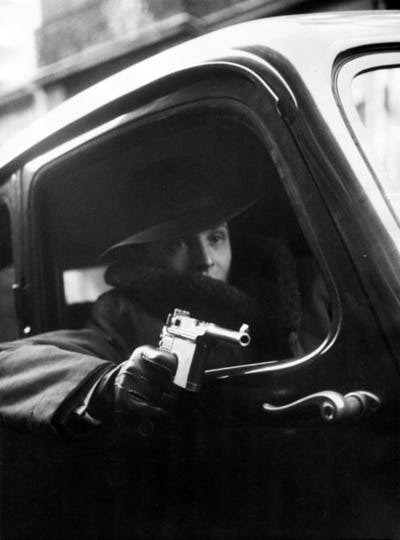
Now that I’m back into the swing of noir, I’ve been revisiting some of my past essays on the art of this wonderful, seedy, stylish, dark, and darkly funny genre. I think it was Otto Penzler who said, “Noir requires a sense of bleakness and despair, and characters so flawed, their failure is in their DNA.”
I love that. Wish I’d said it.
Apparently, I have said other things, though. For instance, in an essay from way back in 2013, I took note of Raymond Chandler’s style: “His characters were funny,” I wrote. “They were wry, off-kilter, even pathetic. A conspicuous longing punctuated their wisecracks instead of the usual punch line; he used the screech of a tire in place of a pa-dum-pum. I mean really, is there a better comic line than, ‘From thirty feet away she looked like a lot of class. From ten feet away she looked like something made up to be seen from thirty feet away?’ Taken out of context, that’s a line that could have just as easily come out of Saturday Night Live.”
I stand by that, even if I have absolutely no memory of writing it.
One of the interesting things about being a long-time writer who has gotten a lot of thoughts and words down on the page is that you honest-to-God forget what you’ve written. As I’ve been rereading some of my fiction and general thoughts on the craft of the noir thriller – like the Raymond Chandler observation above – I feel as if I’m taking it all in for the first time, and that it could’ve – almost – been written by someone else. There are times I’m pleased as punch about a quip, interpretation, or description. On other occasions I see a sentence trying too hard, a mixed metaphor, an attempted elucidation that only manages to muddle or misses the mark entirely.
Naturally, I’m not the only writer who experiences this. It’s a common phenomenon, I’m told, and one that’s baked into the byzantine experience of diving into a fantasy set of circumstances, building a world around those happenings, and getting to know the motley crew of characters that populate that world. “People” who take on a life of their own that often seems to have only a passing resemblance to the one we gave them. Or thought we gave them.
 Didn’t see this coming.
Didn’t see this coming.It was Falkner who said, “It begins with a character, all I can do is trot along behind him trying to put down what he says and does.” If you’re not a fiction writer, it’s probably hard to imagine just how spot on is Falkner’s description of the process. Seems as counterintuitive, perhaps, as forgetting your own damned prose. Aren’t writers the gods and masters of their work, and don’t they feel a familiarity with their words that’s on par with the one that’s innate between a mother and child?
As a mother myself, I’d have to say – not exactly. The following around part definitely sounds familiar, but I can say without hesitation that I would never forget a child I created and nurtured. Yet, despite how much blood, sweat, and tears I’ve put into my stories, I feel a genuine sense of novelty each time I sit down to re-read one of my books. The reason I have to reread them in the first place is because I need to make sure that the next book in the series matches the previous ones in both continuity and tone. I actually take notes, even when I’m reading one of my finished novels for the third or fourth time.
Maybe that loss of creative memory is what keeps a writer fresh. A style, after all, is a combination of taste, interest, experience, and what a writer has to say about all of those things at a given moment in time, during a specific sequence of events. If you’re doing it right, you see something new each time you sit down to your story and the people you’ve placed into it.
There’s never any guarantee that the creative muse will deliver. And when she does show up, it’s anyone’s guess as to whether her input will be any good. Sometimes our muses offer interesting ideas that just don’t fit, that are too weird, maybe too clever for their own good. Or just plain meh.
Muses are fickle that way.
But after all the elements have been culled, and we’ve put in the time, the creative muscle, the reflection, the vision, and the fantasy, we have the raw materials for something that might just come together. When a scribe finally finishes her story, hopefully there will be enough of the original to make it interesting, but not so much as to make the story unrelatable. It’s a fine line.
One I hope I’m walking with the grace and panache of this broad. But you be the judge.
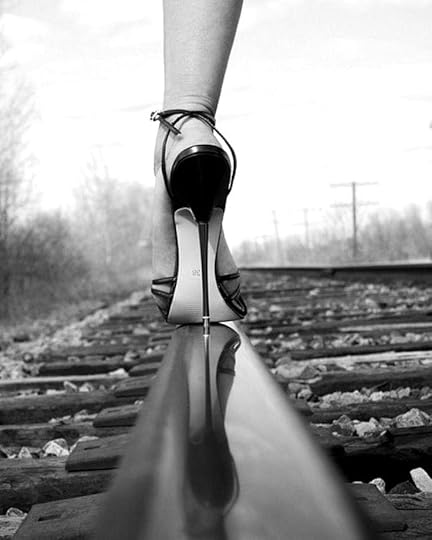
Bombay, India 1959
A hard rain came out of nowhere, and Magdalena jogged to a peepal tree, huddling under its large, heart-shaped leaves. Unlike her, Fedot didn’t quicken his step. He walked in a deliberate fashion up the mossy, slate pathway to the house, opened the front door, and disappeared inside.
Magdalena ran right after him, becoming soaked to the skin in just the short way from the shelter of her tree to the entry of the old house. To her relief, and frankly, surprise, the place remained unlocked, and she was able to go right in.
The door opened to a time-worn marble foyer with wrought iron flourishes. Identical Roman pedestals made of pock-marked stone flanked a pair of glass French doors leading into a passageway. They creaked just a bit when she opened them, and Magdalena cursed under her breath. Removing her shoes, she stepped barefoot into the passage, not making a sound this time.
Standing there, eyes closed, she listened until she picked up a voice speaking barely above a whisper – Fedot’s. It made her heart pound, though she couldn’t really say why. Fedot was sly and evasive, like all spies, but she’d never felt like she was in any particular danger around him. Of course, she’d never stalked him in the pre-dawn hours before, going to places that maybe he didn’t want her to see. With trembling hands and goose-pimpled skin, she followed Fedot’s voice up a back staircase, its walls flecked with age-old grime and fingerprints.
It was surprisingly cool and dry in the house, despite the rain and humidity outside. She imagined that smart old houses like this one were built to withstand monsoon season, so a single morning rain was nothing. Upstairs, once she entered the hallway, things were far less dry. In fact, the walls were sweating quite a bit and now so was she. Magdalena almost felt as if she was standing outside. The reason for this was obvious once she got closer to the two bedrooms at the far back of the home. Those had open terraces, covered but intruded upon by the garden trees that stretched out behind the house. Lovely, wild, thick with leaves.
Fedot’s voice had fallen off, but she knew where it had come from and veered to the left, into a room lit by lanterns that cast luxurious light onto the perfect mosaic tiles. A large bed sat at the center of the room, covered in an explosively beautiful silk quilt that looked to be sewn of the finest saris. It seemed like an heirloom a mother would give her daughter, one made of her ancestors’ wedding dresses perhaps.
Fedot was sitting on the bed, leaning over someone who looked half dead. There was a distinctive smell of vomit in the room somewhat masked by the thick air of flora, but not enough.
“My God, Fedot,” she said. “Is that who I think it is?”
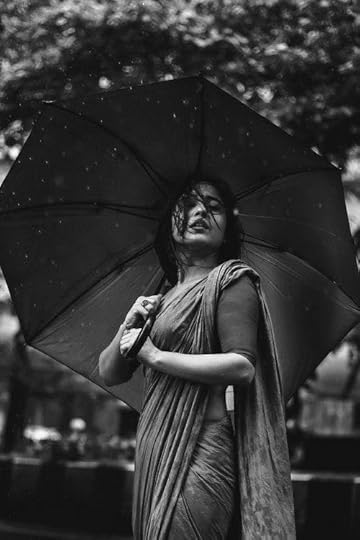 Victoria’s Amazon Page
Victoria’s Amazon Page



